Faye Fite's Blog, page 25
July 22, 2016
How to Write Even When You Don't Feel Like It
Writing is hard. Sometimes you just don't want to do it. You stare at your project and think, "Ah man. I really don't feel like doing that right now. Or anytime soon, honestly."
I get it. I really do. And, because I get it, I can say this:
Stop your whining!! Why are you not writing right now? What's wrong with you?! You've been putting off that story of yours for far too long. So get off the internet and start writing!
Easier said than done, you say. Or is it?
Here are 7 ways to get your writer on even when you really, really don't feel like it: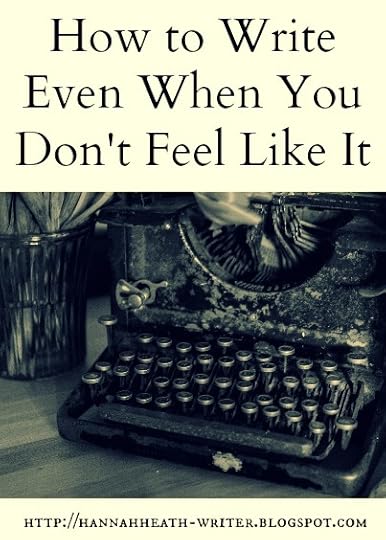 1. Identify the problem. So what is it that's bothering you? Maybe you're scared of writing complete junk. Maybe you think you don't have enough time. Maybe you don't feel inspired. Maybe your favorite kind of tea is no longer available. Find out what it is that's making it difficult to write. Can't place your finger on it? That's okay. Why? Because...
1. Identify the problem. So what is it that's bothering you? Maybe you're scared of writing complete junk. Maybe you think you don't have enough time. Maybe you don't feel inspired. Maybe your favorite kind of tea is no longer available. Find out what it is that's making it difficult to write. Can't place your finger on it? That's okay. Why? Because...
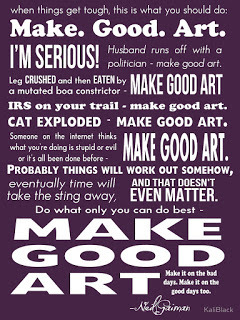 Quote from Make Good Art by Neil Gaiman2. Recognize that this problem doesn't matter. But Hannah, you say, yes, it does matter. That's why it's called a problem. Pffft. That's completely mental. The problem is not the problem. The problem is your attitude about the problem. There is absolutely nothing standing in your way that you cannot overcome. Don't believe me? I have Lyme disease, meaning my hands hurt all of the time, especially when I'm writing. And yet, I'm able to get one to two blog posts out each week, write a bit of my novel almost every day, while also working part time and being a part time college student. Now look me (or, you know, my profile picture) in the eye and tell me about how you can't write through your problem....Yeah. That's what I thought. You feel dumb, don't you? And not only because you just talked to a picture on your computer screen.
Quote from Make Good Art by Neil Gaiman2. Recognize that this problem doesn't matter. But Hannah, you say, yes, it does matter. That's why it's called a problem. Pffft. That's completely mental. The problem is not the problem. The problem is your attitude about the problem. There is absolutely nothing standing in your way that you cannot overcome. Don't believe me? I have Lyme disease, meaning my hands hurt all of the time, especially when I'm writing. And yet, I'm able to get one to two blog posts out each week, write a bit of my novel almost every day, while also working part time and being a part time college student. Now look me (or, you know, my profile picture) in the eye and tell me about how you can't write through your problem....Yeah. That's what I thought. You feel dumb, don't you? And not only because you just talked to a picture on your computer screen.
3. Remove your so-called obstacles. Schedule a time you want to write. Think of all of the things that are going to get in your way during this time. Now, go about and systematically eliminate these obstacles. Unless they're people...that's murder, one of the worst crimes, so, yeah. Illegal. Don't do it. Social media distracting you? Don't open up those tabs in your internet. Afraid that you won't be able to write anything good? That's okay. No pressure. If you don't like what you write, you can always learn from it and then delete it. Your kids won't give you any peace? Lock them in a closet. Wait, no, that's probably considered child abuse. Lock yourself in a closet. Okay, so maybe your problem isn't so much lack of time, but a lack of motivation or inspiration. In which case:
4. Remember that you don't need inspiration or motivation to write. Ever. I think a lot of writers sit down at their computers, can't immediately think of some beautiful paragraph to write, and decide that the stars are not in position for this task. Seriously? No. This is unacceptable. You sit down and write even if you don't feel like it...even if you have no ideas whatsoever. If you're waiting for inspiration to hit, your writing project will take forever. So grit your teeth, force yourself to write even when you have absolutely no desire to do so. Fun? No. But writing isn't always unicorns and sparkles. Anyone who says differently is selling something.
Seriously? No. This is unacceptable. You sit down and write even if you don't feel like it...even if you have no ideas whatsoever. If you're waiting for inspiration to hit, your writing project will take forever. So grit your teeth, force yourself to write even when you have absolutely no desire to do so. Fun? No. But writing isn't always unicorns and sparkles. Anyone who says differently is selling something.
5. Don't be afraid of writing garbage. Even if you start writing and ever single word that you put down is something that you'll have to delete later, keep going. You're just finding all of the ways that your book should not be written. Just this morning I had to go back and delete two pages that I wrote the night before. I spent an hour on those two pages and there was no way to salvage them. I knew they would need to be deleted even as I was writing them, but I kept going. Why? Because I knew that if I threw my hands up in disgust and stopped writing last night, I would end up dreading picking it up again tonight. So I thought, "Well, get all the garbage out tonight so maybe you'll have a chance at writing something good tomorrow." Now I'm looking forward to writing again tonight because I know what I did wrong and I would like a shot at fixing it. So yes, maybe you're going to write garbage today. But that means nothing in the grand scheme of things. Tomorrow you might write something wonderful. That's the beauty of writing.
6. Recognize your worth as a writer. You are the only person in this universe, past, present, or future, who is capable of writing this story. There are unique thoughts, feelings, memories, writing styles, and ideas all converging at a single point: You. The task of writing this story was appointed to you, and if you do not find a way, no one will. That is a very, very big deal. So why are you putting it off? Because you think you won't get it right? Because you're afraid? Because you simply don't feel like it? Please. You are the only one who can do this. You are unique. You have a talent. Use it.
7. Know that you will be glad that you wrote. It is normal to not want to write. Don't feel bad about it. Just remember: You like writing. You may not feel like it right now, but you really do. Once you actually sit down and start writing, you're going to be glad for it. The only way you won't be glad about it is if you get down on yourself for writing garbage. And, as we already discussed, garbage is fine.
And that's all I have to say on the subject. To sum up: If you're struggling with not wanting to work on your writing, remember these three things: 1) The longer you stay way from writing, the harder it will be to get back into it and the worse you will feel about yourself. 2) You are actually going to be happy to get back into writing. 3) The garbage will do.
Have any tips or tricks you'd like to share? Please leave them below! And don't forget to tell me about you current writing troubles and your plan to fix them. I know you can do it.
Related articles:
What To Do When Your Story Bogs Down
Controlling Your Plot Bunnies: How to Write A Novel From Start to Finish Without Getting Distracted10 Way to Make Your Writing Time More ProductiveSaveSaveSaveSave
Enjoy this post? Take a look around. If you like what you see, please don't forget to subscribe by email for a new post every week!SaveSave
SaveSave
I get it. I really do. And, because I get it, I can say this:
Stop your whining!! Why are you not writing right now? What's wrong with you?! You've been putting off that story of yours for far too long. So get off the internet and start writing!
Easier said than done, you say. Or is it?
Here are 7 ways to get your writer on even when you really, really don't feel like it:
 1. Identify the problem. So what is it that's bothering you? Maybe you're scared of writing complete junk. Maybe you think you don't have enough time. Maybe you don't feel inspired. Maybe your favorite kind of tea is no longer available. Find out what it is that's making it difficult to write. Can't place your finger on it? That's okay. Why? Because...
1. Identify the problem. So what is it that's bothering you? Maybe you're scared of writing complete junk. Maybe you think you don't have enough time. Maybe you don't feel inspired. Maybe your favorite kind of tea is no longer available. Find out what it is that's making it difficult to write. Can't place your finger on it? That's okay. Why? Because... Quote from Make Good Art by Neil Gaiman2. Recognize that this problem doesn't matter. But Hannah, you say, yes, it does matter. That's why it's called a problem. Pffft. That's completely mental. The problem is not the problem. The problem is your attitude about the problem. There is absolutely nothing standing in your way that you cannot overcome. Don't believe me? I have Lyme disease, meaning my hands hurt all of the time, especially when I'm writing. And yet, I'm able to get one to two blog posts out each week, write a bit of my novel almost every day, while also working part time and being a part time college student. Now look me (or, you know, my profile picture) in the eye and tell me about how you can't write through your problem....Yeah. That's what I thought. You feel dumb, don't you? And not only because you just talked to a picture on your computer screen.
Quote from Make Good Art by Neil Gaiman2. Recognize that this problem doesn't matter. But Hannah, you say, yes, it does matter. That's why it's called a problem. Pffft. That's completely mental. The problem is not the problem. The problem is your attitude about the problem. There is absolutely nothing standing in your way that you cannot overcome. Don't believe me? I have Lyme disease, meaning my hands hurt all of the time, especially when I'm writing. And yet, I'm able to get one to two blog posts out each week, write a bit of my novel almost every day, while also working part time and being a part time college student. Now look me (or, you know, my profile picture) in the eye and tell me about how you can't write through your problem....Yeah. That's what I thought. You feel dumb, don't you? And not only because you just talked to a picture on your computer screen. 3. Remove your so-called obstacles. Schedule a time you want to write. Think of all of the things that are going to get in your way during this time. Now, go about and systematically eliminate these obstacles. Unless they're people...that's murder, one of the worst crimes, so, yeah. Illegal. Don't do it. Social media distracting you? Don't open up those tabs in your internet. Afraid that you won't be able to write anything good? That's okay. No pressure. If you don't like what you write, you can always learn from it and then delete it. Your kids won't give you any peace? Lock them in a closet. Wait, no, that's probably considered child abuse. Lock yourself in a closet. Okay, so maybe your problem isn't so much lack of time, but a lack of motivation or inspiration. In which case:
4. Remember that you don't need inspiration or motivation to write. Ever. I think a lot of writers sit down at their computers, can't immediately think of some beautiful paragraph to write, and decide that the stars are not in position for this task.
 Seriously? No. This is unacceptable. You sit down and write even if you don't feel like it...even if you have no ideas whatsoever. If you're waiting for inspiration to hit, your writing project will take forever. So grit your teeth, force yourself to write even when you have absolutely no desire to do so. Fun? No. But writing isn't always unicorns and sparkles. Anyone who says differently is selling something.
Seriously? No. This is unacceptable. You sit down and write even if you don't feel like it...even if you have no ideas whatsoever. If you're waiting for inspiration to hit, your writing project will take forever. So grit your teeth, force yourself to write even when you have absolutely no desire to do so. Fun? No. But writing isn't always unicorns and sparkles. Anyone who says differently is selling something. 5. Don't be afraid of writing garbage. Even if you start writing and ever single word that you put down is something that you'll have to delete later, keep going. You're just finding all of the ways that your book should not be written. Just this morning I had to go back and delete two pages that I wrote the night before. I spent an hour on those two pages and there was no way to salvage them. I knew they would need to be deleted even as I was writing them, but I kept going. Why? Because I knew that if I threw my hands up in disgust and stopped writing last night, I would end up dreading picking it up again tonight. So I thought, "Well, get all the garbage out tonight so maybe you'll have a chance at writing something good tomorrow." Now I'm looking forward to writing again tonight because I know what I did wrong and I would like a shot at fixing it. So yes, maybe you're going to write garbage today. But that means nothing in the grand scheme of things. Tomorrow you might write something wonderful. That's the beauty of writing.
6. Recognize your worth as a writer. You are the only person in this universe, past, present, or future, who is capable of writing this story. There are unique thoughts, feelings, memories, writing styles, and ideas all converging at a single point: You. The task of writing this story was appointed to you, and if you do not find a way, no one will. That is a very, very big deal. So why are you putting it off? Because you think you won't get it right? Because you're afraid? Because you simply don't feel like it? Please. You are the only one who can do this. You are unique. You have a talent. Use it.
7. Know that you will be glad that you wrote. It is normal to not want to write. Don't feel bad about it. Just remember: You like writing. You may not feel like it right now, but you really do. Once you actually sit down and start writing, you're going to be glad for it. The only way you won't be glad about it is if you get down on yourself for writing garbage. And, as we already discussed, garbage is fine.
And that's all I have to say on the subject. To sum up: If you're struggling with not wanting to work on your writing, remember these three things: 1) The longer you stay way from writing, the harder it will be to get back into it and the worse you will feel about yourself. 2) You are actually going to be happy to get back into writing. 3) The garbage will do.
Have any tips or tricks you'd like to share? Please leave them below! And don't forget to tell me about you current writing troubles and your plan to fix them. I know you can do it.
Related articles:
What To Do When Your Story Bogs Down
Controlling Your Plot Bunnies: How to Write A Novel From Start to Finish Without Getting Distracted10 Way to Make Your Writing Time More ProductiveSaveSaveSaveSave
Enjoy this post? Take a look around. If you like what you see, please don't forget to subscribe by email for a new post every week!SaveSave
SaveSave

Published on July 22, 2016 07:30
July 15, 2016
Writing Teenage Characters: What You're Doing Wrong
Teenagers. They're a species of humans generally disliked by both adults and children. It's seen as some kind of horrible disease that pops up around 13 and supposedly miraculously disappears at the age of 18 or 20, depending on how one interprets the word teenager or the laws concerning minors. Suffice it to say that teenagers are not a favorite part of most societies.
And yet, books featuring teenage characters are some of the most popular stories known to modern man.
Makes total sense, right?
Yeah, not really.
Because teenagers are generally frowned upon and not well understood, they almost always suffer when they are converted into book characters. As a writer of YA, I spend a lot of time reading YA fiction. It is very rare that I run across a teenage character and think, "Yeah, this one was done really well!" Most of the time it ends up being, "Idiots. They're all idiots!"
Allow me to explain to you all of the various ways that many writers manage to ruin their teen characters, along with ways to fix them.
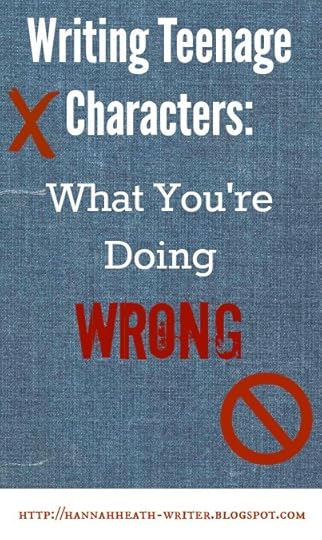 1. You are generalizing. This is the number one problem that spans across all genres and effectively ruins potentially awesome characters. Your character needs to be treated as an individual with unique personality traits and interests, not as part of the teenage body. As soon as your character's defining trait becomes "teenager," you have lost all hope creating anything other than an annoying, stereotypical fictional person.
1. You are generalizing. This is the number one problem that spans across all genres and effectively ruins potentially awesome characters. Your character needs to be treated as an individual with unique personality traits and interests, not as part of the teenage body. As soon as your character's defining trait becomes "teenager," you have lost all hope creating anything other than an annoying, stereotypical fictional person.
2. You aren't taking time period or society into account. This is the part where I tell you about how teenager is a fairly new word, that "back then" you were either a child or an adult, that teenagers were expected to run houses, have jobs, and function as adults, were actually able to pull it off, yada yada yada. But I'm not going to, because I'm sure you've heard that before, and yet it doesn't seem to matter to most writers. So go ahead and ignore all that and plop your teenager into medieval times and have him act like an immature idiot. Or make your Indian girl be extremely disrespectful toward her elders and get away with it. Go on. I'm sure it'll be fine.
3. You are relying on cliches. The characters defined by their love triangles, the "I can change him" girl, the guy with absent parents, the bookworm nerd, the brooding jock, the hot one. *slaps upside the head with your own manuscript* Stop it! You are a writer, not a copy cat. Besides, if you are going to rip something off, then rip something of that isn't subpar and completely horrendous.
4. You're using the "teenagers have bad decision-making skills" excuse. In an attempt to explain away the fact that your characters are acting like idiots, you may try to say that they do dumb things because they are teens and thus don't make good choices because they're too young to know differently. Let's get something straight: Teenagers are not stupid. They have brains and are perfectly capable of using them. You need to develop your character so that any bad decision he/she may make is specific to him and his mentality and his past. Teenagers don't make bad decisions simply because they're teenagers. It goes far deeper than that, so find the root of the problem that is unique to your character and go with that.
5. Your slang skills are horrible. If you are writing contemporary fiction, please, for the love good dialogue, go talk to some real teens. You will soon discover that they do not say things like, "OMG, that was, like, totes cray cray." They just don't. If you want your characters to talk like teenagers, then let them talk like teenagers, not like some crackpot 80-year-old alien who has come to earth and is attempting to masquerade as a teen. Unless you actually are writing a book about crackpot 80-year-old alien who has come to earth and is attempting to masquerade as a teen, in which case, that sounds amazing and I applaud your genius
6. Every piece of dialogue you write is dripping with sarcasm. Some teenagers are very sarcastic, some are only a little bit sarcastic, some are not sarcastic at all. If all of your characters have sass buckets for their patronus's, then you have some serious editing to do. I suppose you think your pieces of dialogue are terribly clever, but they probably aren't. They will get very old, very fast, so tone it down. Try reading this guide for writing sarcasm.
7. Your character is extremely troubled. The teen who drinks too much, has abusive parents, misuses his ADHD meds, is bulimic, and is in and out of juvy. This may come as a shock, but that is a rather extreme scenario. Try to find a middle ground. No, I am not saying that troubled teens don't exist, but I am saying that they have become the focus of many stories, so much so that there is a huge (and unhealthy) imbalance in YA fiction.
8. Adult characters are lead by your teen character. The world is in shambles, people are dying left and right, freedom has disappeared, and for some reason the only clothes available are grey-colored. A leader is needed to fix this broken, dying, ugly-clothes world. So everyone decides to herald a sixteen year old girl as their leader. Sounds like a great plan, right? While it is not absurd to think that a teenager can be elemental in leading a group of people, it is absurd to think that adults would choose said teen as their unrivaled leader. So please, don't be such a clotpole. Use your brain to create realistic situations.
9. Your teen is constantly thinking about crushes. While you may spend most of you time playing "he loves me, he loves me not" in high-stress situations such as zombie apocalypses, most people do not. Stop putting your character in a position where he/she is trying to save the world while also fretting about which crush to choose. Here's a fun idea: How about the crushes stop trying to hit on the main character and instead come along side her and try to make her life easier rather than harder? And, if you aren't writing an action novel, please remember that sex should not be the main point of your story. Give your characters a personality and a reason for existing. If you have to put sex in there to make your story interesting, then you're doing it wrong.
And there you have it. 9 common mistakes writers make when writing teenage characters. What do you think? Did I miss any or get any wrong? Tell me about it in the comment section below!
Related articles:
7 Cliche Characters in YA Fiction that Need to Stop
Writing Strong Female Characters: What You're Doing Wrong
Writing Awesome Male Characters: What You're Doing Wrong
Enjoy this post? Take a look around. If you like what you see, please don't forget to subscribe by email for a new post every Friday!
And yet, books featuring teenage characters are some of the most popular stories known to modern man.
Makes total sense, right?
Yeah, not really.
Because teenagers are generally frowned upon and not well understood, they almost always suffer when they are converted into book characters. As a writer of YA, I spend a lot of time reading YA fiction. It is very rare that I run across a teenage character and think, "Yeah, this one was done really well!" Most of the time it ends up being, "Idiots. They're all idiots!"
Allow me to explain to you all of the various ways that many writers manage to ruin their teen characters, along with ways to fix them.
 1. You are generalizing. This is the number one problem that spans across all genres and effectively ruins potentially awesome characters. Your character needs to be treated as an individual with unique personality traits and interests, not as part of the teenage body. As soon as your character's defining trait becomes "teenager," you have lost all hope creating anything other than an annoying, stereotypical fictional person.
1. You are generalizing. This is the number one problem that spans across all genres and effectively ruins potentially awesome characters. Your character needs to be treated as an individual with unique personality traits and interests, not as part of the teenage body. As soon as your character's defining trait becomes "teenager," you have lost all hope creating anything other than an annoying, stereotypical fictional person.2. You aren't taking time period or society into account. This is the part where I tell you about how teenager is a fairly new word, that "back then" you were either a child or an adult, that teenagers were expected to run houses, have jobs, and function as adults, were actually able to pull it off, yada yada yada. But I'm not going to, because I'm sure you've heard that before, and yet it doesn't seem to matter to most writers. So go ahead and ignore all that and plop your teenager into medieval times and have him act like an immature idiot. Or make your Indian girl be extremely disrespectful toward her elders and get away with it. Go on. I'm sure it'll be fine.
3. You are relying on cliches. The characters defined by their love triangles, the "I can change him" girl, the guy with absent parents, the bookworm nerd, the brooding jock, the hot one. *slaps upside the head with your own manuscript* Stop it! You are a writer, not a copy cat. Besides, if you are going to rip something off, then rip something of that isn't subpar and completely horrendous.
4. You're using the "teenagers have bad decision-making skills" excuse. In an attempt to explain away the fact that your characters are acting like idiots, you may try to say that they do dumb things because they are teens and thus don't make good choices because they're too young to know differently. Let's get something straight: Teenagers are not stupid. They have brains and are perfectly capable of using them. You need to develop your character so that any bad decision he/she may make is specific to him and his mentality and his past. Teenagers don't make bad decisions simply because they're teenagers. It goes far deeper than that, so find the root of the problem that is unique to your character and go with that.
5. Your slang skills are horrible. If you are writing contemporary fiction, please, for the love good dialogue, go talk to some real teens. You will soon discover that they do not say things like, "OMG, that was, like, totes cray cray." They just don't. If you want your characters to talk like teenagers, then let them talk like teenagers, not like some crackpot 80-year-old alien who has come to earth and is attempting to masquerade as a teen. Unless you actually are writing a book about crackpot 80-year-old alien who has come to earth and is attempting to masquerade as a teen, in which case, that sounds amazing and I applaud your genius
6. Every piece of dialogue you write is dripping with sarcasm. Some teenagers are very sarcastic, some are only a little bit sarcastic, some are not sarcastic at all. If all of your characters have sass buckets for their patronus's, then you have some serious editing to do. I suppose you think your pieces of dialogue are terribly clever, but they probably aren't. They will get very old, very fast, so tone it down. Try reading this guide for writing sarcasm.
7. Your character is extremely troubled. The teen who drinks too much, has abusive parents, misuses his ADHD meds, is bulimic, and is in and out of juvy. This may come as a shock, but that is a rather extreme scenario. Try to find a middle ground. No, I am not saying that troubled teens don't exist, but I am saying that they have become the focus of many stories, so much so that there is a huge (and unhealthy) imbalance in YA fiction.
8. Adult characters are lead by your teen character. The world is in shambles, people are dying left and right, freedom has disappeared, and for some reason the only clothes available are grey-colored. A leader is needed to fix this broken, dying, ugly-clothes world. So everyone decides to herald a sixteen year old girl as their leader. Sounds like a great plan, right? While it is not absurd to think that a teenager can be elemental in leading a group of people, it is absurd to think that adults would choose said teen as their unrivaled leader. So please, don't be such a clotpole. Use your brain to create realistic situations.
9. Your teen is constantly thinking about crushes. While you may spend most of you time playing "he loves me, he loves me not" in high-stress situations such as zombie apocalypses, most people do not. Stop putting your character in a position where he/she is trying to save the world while also fretting about which crush to choose. Here's a fun idea: How about the crushes stop trying to hit on the main character and instead come along side her and try to make her life easier rather than harder? And, if you aren't writing an action novel, please remember that sex should not be the main point of your story. Give your characters a personality and a reason for existing. If you have to put sex in there to make your story interesting, then you're doing it wrong.
And there you have it. 9 common mistakes writers make when writing teenage characters. What do you think? Did I miss any or get any wrong? Tell me about it in the comment section below!
Related articles:
7 Cliche Characters in YA Fiction that Need to Stop
Writing Strong Female Characters: What You're Doing Wrong
Writing Awesome Male Characters: What You're Doing Wrong
Enjoy this post? Take a look around. If you like what you see, please don't forget to subscribe by email for a new post every Friday!

Published on July 15, 2016 07:55
July 8, 2016
Why There's No Such Thing As "Just A Story"
"It's just a story."
There's phrase that never ceases to bother me. I've heard it used in several different contexts, all of them absurd.
"Oh, don't get so worked up over the bad messages in that novel. It's just a story."
"I don't know if being a writer is the right choice. What difference will I be able to make? After all, they're just stories."
"Don't worry so much about how people interpret your writing. It's just a story."
I've always found that phrase odd. It's an accumulation of absurdities, ignorance, and thoughtlessness. "It's just a story." Since when did we start telling ourselves such problematic mistruths?
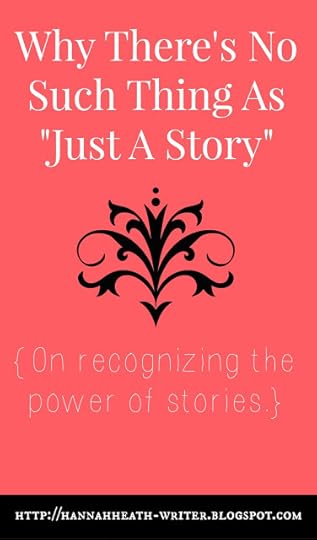 Words have a way of sticking with us. We remember compliments we've received from loved ones many years ago, and have no end of trouble forgetting the hurtful things said to us when we were young. We draw strength from scriptures and are motivated by song lyrics.
Words have a way of sticking with us. We remember compliments we've received from loved ones many years ago, and have no end of trouble forgetting the hurtful things said to us when we were young. We draw strength from scriptures and are motivated by song lyrics.
Through words, men have been inspired to fly halfway across the world to minister to people they have never met. Because of words, men have been whipped into a frenzy and slaughtered those they had no true quarrel with.
It only makes sense that words, when put into the form of stories, are just as powerful as conversations or speeches. Perhaps even more so.
How many times have you read a novel and been forced to sit back and think about the world in a way you never would have otherwise?
How many times has the story of one person's courage or faith inspired the same feelings in you?
How many times has a story changed your life?
For me, the answer to these questions is the same: Many times. 1984 made me think about my freewill and ask myself how far I would be willing to go to preserve it. I draw strength from Samwise Gamgee's perseverance, am inspired by Remus's fight against a disease that threatened to overtake him, and am in awe of Liesel's hunger to use words to do beautiful things. The story of the King who gave his life for the entire world changed my life.
I look at this and it is clear to me that there is no such thing as "just a story."
Stories are many things, but they are not small and they are not meaningless. Stories have an immeasurable amount of sway over our lives, and this sway has grown even larger because people are no longer aware of it.
Because people are convinced that they are "just stories," they forget to be careful about what kinds of stories they are putting into the world or allowing into their minds.
Because they are just stories, authors no longer write their stories for a reason. They forget that novels can help shape the way people think. Shelves are full of books that were not meant to mean anything, and thus end up reflecting the hollowness and depravity of the world.
Because they are just stories, readers feel no need to be intentional about what kind of words and images they fill their minds with. They do not recognize how stories can lock into their hearts and change the direction of their thoughts.
Believing that stories are "just stories" does not take away their power. It simply causes people to forget that the power is there, making it all the easier to misuse.
It's about time that people start being intentional about the kinds of stories that are told and listened to.
It's time that we drop the "just."
They are not just stories. They are stories. Tales of ourselves: of who we are and who we strive to be. Accounts of places real and imagined, of people beautiful and ugly, of thoughts noble and evil.
These stories make up the world. They are stories we replay for ourselves in our minds, which we call memories. They are bedtime tales that help us to be unafraid of the monsters under the bed. They are inspiring recollections of brave people, educational tellings of turning points in history. They are gospels that are people's salvation.
They are life.
That is not something to be taken lightly. And there is certainly no "just" about it.
Next time you sit down to write a story, I want you to stop and think about what it is that you are doing. You are creating something of power: you are weaving together truths and dreams and adventures that will take seed in somebody else's mind, possibly your own. You can nudge people into thinking and feeling deeply, or you can stop them from using their minds altogether. You an inspire them into courage and passion and selflessness, of you can let them stay in their comfort zone where they will never grow. You can create a story simply to entertain, or you can create a story that does far more than that.
It is up to you.
Will you treat your work as "just a story," or will you see it for what it is: something strong and powerful and capable of changing the minds and souls that it touches?
Related articles:
Challenging Writer's to Create Stories With Meaning
Challenging Creative Writers To Be More Creative
Be A Writer, Not An Author
Enjoy this post? Please share on social media and take a look around. If you like what you see, don't forget to subscribe by email for a new post every Friday!
There's phrase that never ceases to bother me. I've heard it used in several different contexts, all of them absurd.
"Oh, don't get so worked up over the bad messages in that novel. It's just a story."
"I don't know if being a writer is the right choice. What difference will I be able to make? After all, they're just stories."
"Don't worry so much about how people interpret your writing. It's just a story."
I've always found that phrase odd. It's an accumulation of absurdities, ignorance, and thoughtlessness. "It's just a story." Since when did we start telling ourselves such problematic mistruths?
 Words have a way of sticking with us. We remember compliments we've received from loved ones many years ago, and have no end of trouble forgetting the hurtful things said to us when we were young. We draw strength from scriptures and are motivated by song lyrics.
Words have a way of sticking with us. We remember compliments we've received from loved ones many years ago, and have no end of trouble forgetting the hurtful things said to us when we were young. We draw strength from scriptures and are motivated by song lyrics.Through words, men have been inspired to fly halfway across the world to minister to people they have never met. Because of words, men have been whipped into a frenzy and slaughtered those they had no true quarrel with.
It only makes sense that words, when put into the form of stories, are just as powerful as conversations or speeches. Perhaps even more so.
How many times have you read a novel and been forced to sit back and think about the world in a way you never would have otherwise?
How many times has the story of one person's courage or faith inspired the same feelings in you?
How many times has a story changed your life?
For me, the answer to these questions is the same: Many times. 1984 made me think about my freewill and ask myself how far I would be willing to go to preserve it. I draw strength from Samwise Gamgee's perseverance, am inspired by Remus's fight against a disease that threatened to overtake him, and am in awe of Liesel's hunger to use words to do beautiful things. The story of the King who gave his life for the entire world changed my life.
I look at this and it is clear to me that there is no such thing as "just a story."
Stories are many things, but they are not small and they are not meaningless. Stories have an immeasurable amount of sway over our lives, and this sway has grown even larger because people are no longer aware of it.
Because people are convinced that they are "just stories," they forget to be careful about what kinds of stories they are putting into the world or allowing into their minds.
Because they are just stories, authors no longer write their stories for a reason. They forget that novels can help shape the way people think. Shelves are full of books that were not meant to mean anything, and thus end up reflecting the hollowness and depravity of the world.
Because they are just stories, readers feel no need to be intentional about what kind of words and images they fill their minds with. They do not recognize how stories can lock into their hearts and change the direction of their thoughts.
Believing that stories are "just stories" does not take away their power. It simply causes people to forget that the power is there, making it all the easier to misuse.
It's about time that people start being intentional about the kinds of stories that are told and listened to.
It's time that we drop the "just."
They are not just stories. They are stories. Tales of ourselves: of who we are and who we strive to be. Accounts of places real and imagined, of people beautiful and ugly, of thoughts noble and evil.
These stories make up the world. They are stories we replay for ourselves in our minds, which we call memories. They are bedtime tales that help us to be unafraid of the monsters under the bed. They are inspiring recollections of brave people, educational tellings of turning points in history. They are gospels that are people's salvation.
They are life.
That is not something to be taken lightly. And there is certainly no "just" about it.
Next time you sit down to write a story, I want you to stop and think about what it is that you are doing. You are creating something of power: you are weaving together truths and dreams and adventures that will take seed in somebody else's mind, possibly your own. You can nudge people into thinking and feeling deeply, or you can stop them from using their minds altogether. You an inspire them into courage and passion and selflessness, of you can let them stay in their comfort zone where they will never grow. You can create a story simply to entertain, or you can create a story that does far more than that.
It is up to you.
Will you treat your work as "just a story," or will you see it for what it is: something strong and powerful and capable of changing the minds and souls that it touches?
Related articles:
Challenging Writer's to Create Stories With Meaning
Challenging Creative Writers To Be More Creative
Be A Writer, Not An Author
Enjoy this post? Please share on social media and take a look around. If you like what you see, don't forget to subscribe by email for a new post every Friday!

Published on July 08, 2016 10:10
July 1, 2016
My 2 Year Blogiversary! + A Survey
There are a lot of crazy things that take place in the world. Animal hotels. 8 Fast and Furious films. Twilight fans. The fact that it's 2016 and women's jeans still don't have correctly sized pockets.
But you know what's really crazy?
The fact that my blog has been in existence for a full 2 years.
That's right. Today is my 2 year blogiversary!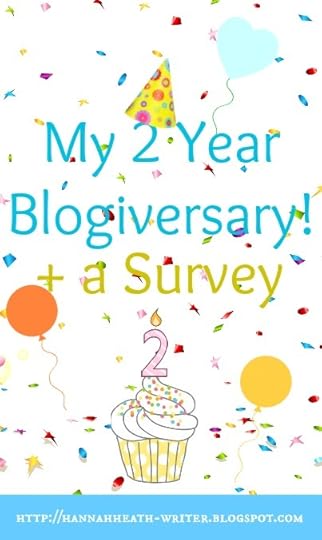 I mean, how did that even happen? You'd think I'd have messed up my blog's code and brought my corner of the internet down around our ears. Or maybe had the NSA knocking on my door, wondering how it was that I thought it appropriate to give people tips on how to make the most out of killing off (fictional) people.
I mean, how did that even happen? You'd think I'd have messed up my blog's code and brought my corner of the internet down around our ears. Or maybe had the NSA knocking on my door, wondering how it was that I thought it appropriate to give people tips on how to make the most out of killing off (fictional) people.
Luckily, neither of those things happened and I know that has nothing to do with me.
It's all you guys. Yep. Not to sound like a Hallmark card, but, without you, none of this would be possible.
On a scale of awesomeness, 1 being Jar Jar Binks and 10 being Batman, you guys are right up there next to Batman. And that's not a compliment I go around giving to just anyone.
You guys join me in my quest to throw nerd references into just about any conversation...or at least follow my progress with tolerant amusement. You share my posts with others, are not ashamed to be seen chatting with me on social media, help me out when I have writing-related questions, give me book recommendations, leave intelligent and thoughtful comments on my posts, and somehow managed to help me scrape up 28 awesome reviews for Skies of Dripping Gold .
As far as I'm concerned, you guys are the best followers that could possibly exist.
In fact, your awesomeness is what inspires me to constantly push this blog to be as best as it can possibly be.
So, to up the awesomeness factor of this blog, I've decided to start giving away free money and books.
Just kidding. Sorry. That was kind of mean.
Seriously, though. I would like to find new ways to improve this blog, but I need your help. I've put together a blog survey to help me figure out how to tweak this blog to fit your needs.
It's 17 questions and doesn't take long to complete (say 5 to 10 minutes). It would really help me gauge my audience and plan for any changes that may or may not need to take place. Your participation would be greatly appreciated.
So what do you say? Will you take it? It's not mandatory, but if you say no I may show up uninvited on your next birthday and proceed to curse you to fall into eternal sleep upon getting a paper cut from your favorite novel. Not sure if you want to risk that, but it's up to you.
Anyway, click below to take the survey. It's not your typical survey....After all, I put it together with my awesome nerd writer audience in mind. Have fun:
Powered by Typeform
Now, would you like to join me for a slice of birthday cake? Help me blow out the candles. 3, 2, 1:
 In case you're wondering what the third year of this blog will bring, allow me to inform you: I have no idea.
In case you're wondering what the third year of this blog will bring, allow me to inform you: I have no idea.
But that's what makes it fun, doesn't it?
I post every Friday, but I rarely know what topic it is that I'm going to post about ahead of time. I try making my own book inspired recipes, but I'm never sure how it will turn out until after I make it. I never know who will follow me or what blog posts it is that people will or will not like.
Hitting the "publish" button each Friday is like a little adventure all on it's own, and it's one that I'm proud to share with you.
So here's to another year of writing tips, reviews, recipes, nerdiness, and adventures. I don't know about you, but I'm pretty dang excited.
Related articles:1 Year Blogging Anniversary: Celebrating My Awesome Followers15 Things I Love About Being A Writer
Enjoy this post? Please share on social media and take a look around. If you like what you see, don't forget to subscribe by email for a new post every Friday!
But you know what's really crazy?
The fact that my blog has been in existence for a full 2 years.
That's right. Today is my 2 year blogiversary!
 I mean, how did that even happen? You'd think I'd have messed up my blog's code and brought my corner of the internet down around our ears. Or maybe had the NSA knocking on my door, wondering how it was that I thought it appropriate to give people tips on how to make the most out of killing off (fictional) people.
I mean, how did that even happen? You'd think I'd have messed up my blog's code and brought my corner of the internet down around our ears. Or maybe had the NSA knocking on my door, wondering how it was that I thought it appropriate to give people tips on how to make the most out of killing off (fictional) people. Luckily, neither of those things happened and I know that has nothing to do with me.
It's all you guys. Yep. Not to sound like a Hallmark card, but, without you, none of this would be possible.
On a scale of awesomeness, 1 being Jar Jar Binks and 10 being Batman, you guys are right up there next to Batman. And that's not a compliment I go around giving to just anyone.
You guys join me in my quest to throw nerd references into just about any conversation...or at least follow my progress with tolerant amusement. You share my posts with others, are not ashamed to be seen chatting with me on social media, help me out when I have writing-related questions, give me book recommendations, leave intelligent and thoughtful comments on my posts, and somehow managed to help me scrape up 28 awesome reviews for Skies of Dripping Gold .
As far as I'm concerned, you guys are the best followers that could possibly exist.
In fact, your awesomeness is what inspires me to constantly push this blog to be as best as it can possibly be.
So, to up the awesomeness factor of this blog, I've decided to start giving away free money and books.
Just kidding. Sorry. That was kind of mean.
Seriously, though. I would like to find new ways to improve this blog, but I need your help. I've put together a blog survey to help me figure out how to tweak this blog to fit your needs.
It's 17 questions and doesn't take long to complete (say 5 to 10 minutes). It would really help me gauge my audience and plan for any changes that may or may not need to take place. Your participation would be greatly appreciated.
So what do you say? Will you take it? It's not mandatory, but if you say no I may show up uninvited on your next birthday and proceed to curse you to fall into eternal sleep upon getting a paper cut from your favorite novel. Not sure if you want to risk that, but it's up to you.
Anyway, click below to take the survey. It's not your typical survey....After all, I put it together with my awesome nerd writer audience in mind. Have fun:
Powered by Typeform
Now, would you like to join me for a slice of birthday cake? Help me blow out the candles. 3, 2, 1:
 In case you're wondering what the third year of this blog will bring, allow me to inform you: I have no idea.
In case you're wondering what the third year of this blog will bring, allow me to inform you: I have no idea. But that's what makes it fun, doesn't it?
I post every Friday, but I rarely know what topic it is that I'm going to post about ahead of time. I try making my own book inspired recipes, but I'm never sure how it will turn out until after I make it. I never know who will follow me or what blog posts it is that people will or will not like.
Hitting the "publish" button each Friday is like a little adventure all on it's own, and it's one that I'm proud to share with you.
So here's to another year of writing tips, reviews, recipes, nerdiness, and adventures. I don't know about you, but I'm pretty dang excited.
Related articles:1 Year Blogging Anniversary: Celebrating My Awesome Followers15 Things I Love About Being A Writer
Enjoy this post? Please share on social media and take a look around. If you like what you see, don't forget to subscribe by email for a new post every Friday!

Published on July 01, 2016 07:31
June 24, 2016
7 Absolutely Essential Tips for Writing Sarcastically
Ah. The post you all thought you wanted. It's finally here. Hannah writing an instructional about how to incorporate sarcasm into writing. What could possibly go wrong?
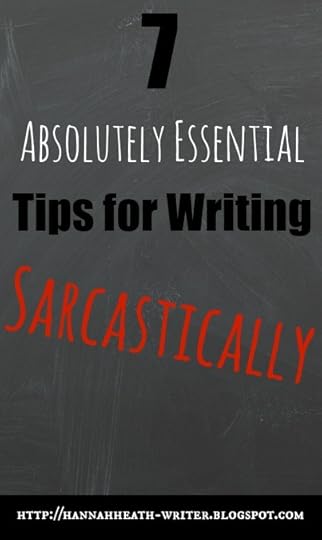 Before we get started, I am going to make two things abundantly clear. The word sarcasm? It doesn't mean what you think it means. In fact, when you use the word "sarcasm," the word you are looking for is probably "irony." See, irony is a type of humor where you express your meaning by using words or phrases that generally mean the opposite. Sarcasm is a subset of irony which uses irony in a malicious or slanderous way.
Before we get started, I am going to make two things abundantly clear. The word sarcasm? It doesn't mean what you think it means. In fact, when you use the word "sarcasm," the word you are looking for is probably "irony." See, irony is a type of humor where you express your meaning by using words or phrases that generally mean the opposite. Sarcasm is a subset of irony which uses irony in a malicious or slanderous way.
So, technically, I'm not sarcastic. At least not mostly. Maybe about 12%. The other 88% is ironic. Betcha didn't know that. Many thanks to my ironic, English-teacher of an Aunt for explaining that to me.
That being cleared up, I will now use the word "irony" throughout this post. Unusual, I know, since nobody uses correct English online anymore. Hopefully I don't destroy a whole fragile system.
Also, this post is going to be ironic. Very, very ironic. Some tips may be serious, but some may not be. How will you be able to tell the difference? Hm. Good question. I'll let you know once I figure out the answer.

Tip #1: Use irony to expose the ignorance and ridiculousness of a person or situation. You know when people are stupid in movies and the only way to straighten them out is to slap them across the face? That's what irony is for in writing. Except, if done incorrectly, rather than knocking some sense into them, it can knock what little sense there was right out of their brain. Irony is a very delicate thing. Use responsibly.
Tip #2: Everybody speaks irony, so don't be afraid to use liberally. It's not as if you're going to hurt anybody's feelings. When you use irony, everyone will know that you're using it and will probably laugh at your cleverness. It rarely happens that people will overlook your genius. Some suggest that you should make it abundantly clear from the start that you're not serious, perhaps by putting up a warning sign or overdosing right out the gate to show the ridiculousness of your words. Me? I don't think that's the way it should be handled.
Tip #3: Pair irony with a serious statement. Irony can be made better by using it as comic-relief in a dark moment. If you have a dark storyline, break it up with something ironic. It's best to give this 'breaking the darkness' role to one character, generally a brooding guy with dark hair and an "I'm ironic" sign hanging from his forehead. It's not as if other writers commonly do this. It's definitely not annoying, especially if it's mean-spirited or unrealistic.
Tip #4: Use all the punctuation and fonts! You can *never* overdose on all the awesome and ~totally helpful~ symbols, italics, and all-caps that your keyboard has to offer. When in doubt, ALWAYS convey your irony through the usage of these glorious keys. Winky smiley faces are also great and never frowned upon by editors. ;) I mean, if you didn't use these tools, people might be forced to use their brains. Last time that happened, people decided to put a 10-minute dance scene in Spider-Man 3. Oh. Wait. Maybe that's what happened when people don't use their brain? I'm not sure. All of this thinking is hurting me.
Tip #5: Exaggeration and deadpanning have no place in irony. Ever. You think I'm kidding? I'm not.
Tip #6: Take lessons from some of the great ironic writers and characters. Douglas Adams (The Hitchhiker's Guide to the Galaxy), Jonathan Swift (A Modest Proposal), Mark Watney (The Martian), William Golding (The Princess Bride), Jane Austen, Iron Man, Eeyore, Loki, Rocket Raccoon, Alfred Pennyworth, practically every character from Harry Potter.
Tip #7: Understand that irony can get old very fast. Some people can write entire books in an ironic tone and people love it, while others can't even make it past the first 10 pages without annoying everyone. Generally, self-deprecating or all-inclusive irony is more acceptable than sarcasm when writing for long periods of time. However, it can be really hard to gauge when you've gone too far, so it's best to stop when you're ahead. For example, I'm currently not sure whether this post is making you laugh or really getting on your nerves, so I'm going to stop now. Sorry. Or you're welcome. Whichever fits.
And there you have it. A very clear guide on how to write ironically.
One thing you should be aware of: With great irony comes great responsibility. Try not to use this type of humor to be hurtful. It's not nice and can wound other's feelings. Whatever those are.
What do you think? Is this a good guide for writing ironically? What tips would you add? Actually, I don't really care. Don't leave any comments. Most definitely do not share this posts with your friends and followers. And it's not like I want you to subscribe to my blog or anything crazy like that.
Related articles:
9 Ways to Use Reading to Improve Your Writing
Controlling Your Plot Bunnies: How to Write A Novel From Start to Finish Without Getting Distracted
The 5-Star Rating System: What Book Reviewers Mean VS How Indie Authors Take It

 Before we get started, I am going to make two things abundantly clear. The word sarcasm? It doesn't mean what you think it means. In fact, when you use the word "sarcasm," the word you are looking for is probably "irony." See, irony is a type of humor where you express your meaning by using words or phrases that generally mean the opposite. Sarcasm is a subset of irony which uses irony in a malicious or slanderous way.
Before we get started, I am going to make two things abundantly clear. The word sarcasm? It doesn't mean what you think it means. In fact, when you use the word "sarcasm," the word you are looking for is probably "irony." See, irony is a type of humor where you express your meaning by using words or phrases that generally mean the opposite. Sarcasm is a subset of irony which uses irony in a malicious or slanderous way.So, technically, I'm not sarcastic. At least not mostly. Maybe about 12%. The other 88% is ironic. Betcha didn't know that. Many thanks to my ironic, English-teacher of an Aunt for explaining that to me.
That being cleared up, I will now use the word "irony" throughout this post. Unusual, I know, since nobody uses correct English online anymore. Hopefully I don't destroy a whole fragile system.
Also, this post is going to be ironic. Very, very ironic. Some tips may be serious, but some may not be. How will you be able to tell the difference? Hm. Good question. I'll let you know once I figure out the answer.

Tip #1: Use irony to expose the ignorance and ridiculousness of a person or situation. You know when people are stupid in movies and the only way to straighten them out is to slap them across the face? That's what irony is for in writing. Except, if done incorrectly, rather than knocking some sense into them, it can knock what little sense there was right out of their brain. Irony is a very delicate thing. Use responsibly.
Tip #2: Everybody speaks irony, so don't be afraid to use liberally. It's not as if you're going to hurt anybody's feelings. When you use irony, everyone will know that you're using it and will probably laugh at your cleverness. It rarely happens that people will overlook your genius. Some suggest that you should make it abundantly clear from the start that you're not serious, perhaps by putting up a warning sign or overdosing right out the gate to show the ridiculousness of your words. Me? I don't think that's the way it should be handled.
Tip #3: Pair irony with a serious statement. Irony can be made better by using it as comic-relief in a dark moment. If you have a dark storyline, break it up with something ironic. It's best to give this 'breaking the darkness' role to one character, generally a brooding guy with dark hair and an "I'm ironic" sign hanging from his forehead. It's not as if other writers commonly do this. It's definitely not annoying, especially if it's mean-spirited or unrealistic.
Tip #4: Use all the punctuation and fonts! You can *never* overdose on all the awesome and ~totally helpful~ symbols, italics, and all-caps that your keyboard has to offer. When in doubt, ALWAYS convey your irony through the usage of these glorious keys. Winky smiley faces are also great and never frowned upon by editors. ;) I mean, if you didn't use these tools, people might be forced to use their brains. Last time that happened, people decided to put a 10-minute dance scene in Spider-Man 3. Oh. Wait. Maybe that's what happened when people don't use their brain? I'm not sure. All of this thinking is hurting me.
Tip #5: Exaggeration and deadpanning have no place in irony. Ever. You think I'm kidding? I'm not.
Tip #6: Take lessons from some of the great ironic writers and characters. Douglas Adams (The Hitchhiker's Guide to the Galaxy), Jonathan Swift (A Modest Proposal), Mark Watney (The Martian), William Golding (The Princess Bride), Jane Austen, Iron Man, Eeyore, Loki, Rocket Raccoon, Alfred Pennyworth, practically every character from Harry Potter.
Tip #7: Understand that irony can get old very fast. Some people can write entire books in an ironic tone and people love it, while others can't even make it past the first 10 pages without annoying everyone. Generally, self-deprecating or all-inclusive irony is more acceptable than sarcasm when writing for long periods of time. However, it can be really hard to gauge when you've gone too far, so it's best to stop when you're ahead. For example, I'm currently not sure whether this post is making you laugh or really getting on your nerves, so I'm going to stop now. Sorry. Or you're welcome. Whichever fits.
And there you have it. A very clear guide on how to write ironically.
One thing you should be aware of: With great irony comes great responsibility. Try not to use this type of humor to be hurtful. It's not nice and can wound other's feelings. Whatever those are.
What do you think? Is this a good guide for writing ironically? What tips would you add? Actually, I don't really care. Don't leave any comments. Most definitely do not share this posts with your friends and followers. And it's not like I want you to subscribe to my blog or anything crazy like that.
Related articles:
9 Ways to Use Reading to Improve Your Writing
Controlling Your Plot Bunnies: How to Write A Novel From Start to Finish Without Getting Distracted
The 5-Star Rating System: What Book Reviewers Mean VS How Indie Authors Take It

Published on June 24, 2016 09:13
June 17, 2016
Butterbeer Inspired by J.K. Rowling's Harry Potter and the Prisoner of Azkaban
Ever since I read Harry Potter, I’ve wanted to go to Hogwarts.
Of course, I’d resigned myself to the fact that that wasn’t going to happen for a long time. I never got my letter, though we all know that’s not due to my lack of magicalness. Voldemort was in power during the 90’s, so a lot of muggle born records were destroyed, which explains my lack of letter: They don't have my address. I have yet to stumble upon a portkey that will take me to Hogwarts and Amazon does not sell working floo powder (huge mistake, guys).
But then something awesome happened. Universal Studios Hollywood opened up Harry Potter World. I finally got to go to Hogwarts!
It was amazing. The castle was magnificent, Hogsmead rocked, and the Forbidden Journey was one of the best rides I’ve ever been one (Note: If you want to hear more about the Harry Potter World in Hollywood, my review is coming soon to Constant Collectible. Stay tuned!).
But that’s all secondary. I’m sure you all have one question you need answered: How was the butterbeer?
Magical.
I took note of the flavor and went home to try to make my own. After all, my book of the month is Harry Potter and the Prisoner of Azkaban , the first book that Butterbeer makes an appearance in.
 For those of you deprived muggles who have not read The Prisoner of Azkaban or perhaps have forgotten it’s storyline, here’s a quick overview:
For those of you deprived muggles who have not read The Prisoner of Azkaban or perhaps have forgotten it’s storyline, here’s a quick overview:
For twelve long years, the dread fortress of Azkaban held an infamous prisoner named Sirius Black. Convicted of killing thirteen people with a single curse, he was said to be the heir apparent to the Dark Lord, Voldemort.
Now he has escaped, leaving only two clues as to where he might be headed: Harry Potter's defeat of You-Know-Who was Black's downfall as well. And the dementors heard Black muttering in his sleep, "He's at Hogwarts...he's at Hogwarts."
Harry Potter isn't safe, not even within the walls of his magical school, surrounded by his friends. Because on top of it all, there may well be a traitor in their midst.
I like this book for a lot of reasons: the Marauder’s Map, the awesomeness of Hippogriffs, the quidditch matches, and the mention of Butterbeer.
But I like it for more sirius reasons, too (sorry, horrible Harry Potter joke. I’ll do better, I promise). I love Lupin’s quiet strength and bravery in the face of a difficult ailment, Rowling’s advice as to how to fend of Dementors has helped me a lot, and Ron’s “Don’t let the muggle get you down” will forever be a mantra of mine. I’m in awe of Rowling’s ability to create a story that is both fantastical and down-to-earth.
So, in honor of this book and Rowling’s brilliance, I’d like to share a recipe for Butterbeer with you.
It is made in three parts: first, a butterscotch syrup must be brewed, then cream soda must be conjured, then some whipped cream summoned. Here we go:
 Butterscotch syrup:
Butterscotch syrup:
Ingredients - 1/2 cup of packed dark brown sugar1/2 cup of heavy cream4 tablespoons of unsalted butter1 teaspoon of vanilla extract1/2 teaspoon of cinnamon (traditionally, butterscotch doesn't have cinnamon, but I added it to this one because I thought it would help give the Butterbeer the "warm" feel described in the books. Also, cinnamon rules.) 1/2 teaspoon of himalayan salt (or sea salt) Directions -
1. Solemnly swear that you are up to no good. This is an essential step. Do NOT skip it.
2. Melt the butter in a saucepan on medium heat. In a bowl, combine the cinnamon, brown sugar, and salt. You'll want to have your vanilla all measured out and ready to go. You'll also want to procure a stickiness-repellant wand or a rubber spatula to stir. I used a spatula after Umbridge's own heart: 3. Once the butter is melted, add the brown sugar mixture to the pan. Once the mixture is wet, add the heavy cream. Stir until combined. Bring to a boil, scraping sides and bottom of the pan occasionally. Allow to boil for 4 to 5 minutes. Once it begins to thicken, remove from heat.
3. Once the butter is melted, add the brown sugar mixture to the pan. Once the mixture is wet, add the heavy cream. Stir until combined. Bring to a boil, scraping sides and bottom of the pan occasionally. Allow to boil for 4 to 5 minutes. Once it begins to thicken, remove from heat.
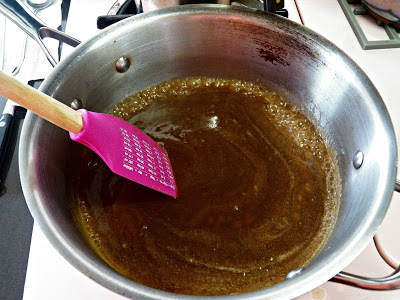 4. Add vanilla extract, then transfer to a container to cool (I used a mason jar). The syrup will thicken considerably while cooling.
4. Add vanilla extract, then transfer to a container to cool (I used a mason jar). The syrup will thicken considerably while cooling.
This stuff is delicious. I would have eaten it all if it hadn't been necessary for the rest of the recipe. Snape thought that it was a poison hexed to make people want to eat it, but soon came around. Cream soda:
Cream soda:
I attempted to make this from scratch, but failed miserably. I'm not sure why. I suspect the nargles. Being a highly-intelligent Ravenclaw, I quickly came up with a solution: Go to the store and buy ready-made cream soda. I recommend getting an all-natural kind, since those tend to have less sugar. I used Virgil's and liked the way it turned out.
Whipped cream:
Ingredients - 1 cup of heavy cream2 teaspoons of butterscotch syrup Sugar to taste (optional)Directions -
1. In a chilled bowl, whip together the heavy cream, butterscotch syrup, and sugar (if wanted). Whip until stiff peaks form.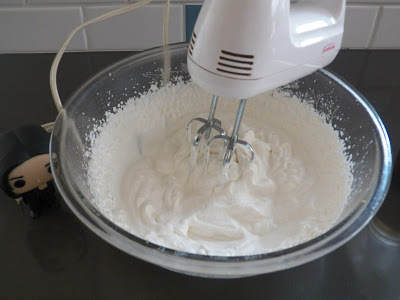 2. Try not to fling cream all over the counter while beating it. I may have failed this step.
2. Try not to fling cream all over the counter while beating it. I may have failed this step.
Assemble Butterbeer:
1. In a small bowl, pour one bottle (12 oz) of cream soda. Gently whisk in 2 teaspoons of butterscotch syrup. Over-wisk and you'll lose the fizziness.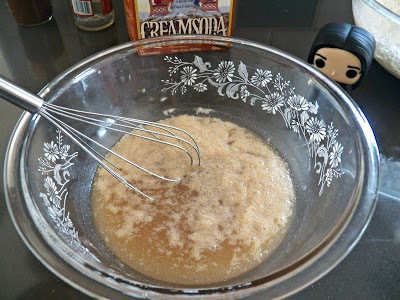 2. Pour this concoction into a mug and top with the whipped cream.
2. Pour this concoction into a mug and top with the whipped cream.
 Mischief managed! You now have Butterbeer that tastes glorious and is very similar to the one at Universal Studios, though not quite so sweet.
Mischief managed! You now have Butterbeer that tastes glorious and is very similar to the one at Universal Studios, though not quite so sweet.
 Even Snape thought it was good.
Even Snape thought it was good.
 It tastes of sunshine and Harry Potter books. In fact, drinking Butterbeer fills a person with so much happiness that I don't think even Dementors would be able to suck it all away. It's basically Dementor repellant.
It tastes of sunshine and Harry Potter books. In fact, drinking Butterbeer fills a person with so much happiness that I don't think even Dementors would be able to suck it all away. It's basically Dementor repellant.
 Have you ever made or drank Butterbeer? Did you like it? What do you think of
Harry Potter and the Prisoners of Azkaban
? Tell me about some of your favorite parts in the comment section below!
Have you ever made or drank Butterbeer? Did you like it? What do you think of
Harry Potter and the Prisoners of Azkaban
? Tell me about some of your favorite parts in the comment section below!
Related articles:
Mrs. Weasley's Chocolate Fudge Inspired by Harry Potter and The Sorcerer's Stone
Pumpkin Juice Inspired by J.K. Rowling's Harry Potter and the Chamber of Secrets
Gluten and Dairy Free Seed-cake, Apple-tart, and Nut Round Recipes Inspired by The Hobbit by J.R.R. TolkienSaveSave
Of course, I’d resigned myself to the fact that that wasn’t going to happen for a long time. I never got my letter, though we all know that’s not due to my lack of magicalness. Voldemort was in power during the 90’s, so a lot of muggle born records were destroyed, which explains my lack of letter: They don't have my address. I have yet to stumble upon a portkey that will take me to Hogwarts and Amazon does not sell working floo powder (huge mistake, guys).
But then something awesome happened. Universal Studios Hollywood opened up Harry Potter World. I finally got to go to Hogwarts!
It was amazing. The castle was magnificent, Hogsmead rocked, and the Forbidden Journey was one of the best rides I’ve ever been one (Note: If you want to hear more about the Harry Potter World in Hollywood, my review is coming soon to Constant Collectible. Stay tuned!).
But that’s all secondary. I’m sure you all have one question you need answered: How was the butterbeer?
Magical.
I took note of the flavor and went home to try to make my own. After all, my book of the month is Harry Potter and the Prisoner of Azkaban , the first book that Butterbeer makes an appearance in.
 For those of you deprived muggles who have not read The Prisoner of Azkaban or perhaps have forgotten it’s storyline, here’s a quick overview:
For those of you deprived muggles who have not read The Prisoner of Azkaban or perhaps have forgotten it’s storyline, here’s a quick overview: For twelve long years, the dread fortress of Azkaban held an infamous prisoner named Sirius Black. Convicted of killing thirteen people with a single curse, he was said to be the heir apparent to the Dark Lord, Voldemort.
Now he has escaped, leaving only two clues as to where he might be headed: Harry Potter's defeat of You-Know-Who was Black's downfall as well. And the dementors heard Black muttering in his sleep, "He's at Hogwarts...he's at Hogwarts."
Harry Potter isn't safe, not even within the walls of his magical school, surrounded by his friends. Because on top of it all, there may well be a traitor in their midst.
I like this book for a lot of reasons: the Marauder’s Map, the awesomeness of Hippogriffs, the quidditch matches, and the mention of Butterbeer.
But I like it for more sirius reasons, too (sorry, horrible Harry Potter joke. I’ll do better, I promise). I love Lupin’s quiet strength and bravery in the face of a difficult ailment, Rowling’s advice as to how to fend of Dementors has helped me a lot, and Ron’s “Don’t let the muggle get you down” will forever be a mantra of mine. I’m in awe of Rowling’s ability to create a story that is both fantastical and down-to-earth.
So, in honor of this book and Rowling’s brilliance, I’d like to share a recipe for Butterbeer with you.
It is made in three parts: first, a butterscotch syrup must be brewed, then cream soda must be conjured, then some whipped cream summoned. Here we go:
 Butterscotch syrup:
Butterscotch syrup: Ingredients - 1/2 cup of packed dark brown sugar1/2 cup of heavy cream4 tablespoons of unsalted butter1 teaspoon of vanilla extract1/2 teaspoon of cinnamon (traditionally, butterscotch doesn't have cinnamon, but I added it to this one because I thought it would help give the Butterbeer the "warm" feel described in the books. Also, cinnamon rules.) 1/2 teaspoon of himalayan salt (or sea salt) Directions -
1. Solemnly swear that you are up to no good. This is an essential step. Do NOT skip it.
2. Melt the butter in a saucepan on medium heat. In a bowl, combine the cinnamon, brown sugar, and salt. You'll want to have your vanilla all measured out and ready to go. You'll also want to procure a stickiness-repellant wand or a rubber spatula to stir. I used a spatula after Umbridge's own heart:
 3. Once the butter is melted, add the brown sugar mixture to the pan. Once the mixture is wet, add the heavy cream. Stir until combined. Bring to a boil, scraping sides and bottom of the pan occasionally. Allow to boil for 4 to 5 minutes. Once it begins to thicken, remove from heat.
3. Once the butter is melted, add the brown sugar mixture to the pan. Once the mixture is wet, add the heavy cream. Stir until combined. Bring to a boil, scraping sides and bottom of the pan occasionally. Allow to boil for 4 to 5 minutes. Once it begins to thicken, remove from heat.
 4. Add vanilla extract, then transfer to a container to cool (I used a mason jar). The syrup will thicken considerably while cooling.
4. Add vanilla extract, then transfer to a container to cool (I used a mason jar). The syrup will thicken considerably while cooling.This stuff is delicious. I would have eaten it all if it hadn't been necessary for the rest of the recipe. Snape thought that it was a poison hexed to make people want to eat it, but soon came around.
 Cream soda:
Cream soda: I attempted to make this from scratch, but failed miserably. I'm not sure why. I suspect the nargles. Being a highly-intelligent Ravenclaw, I quickly came up with a solution: Go to the store and buy ready-made cream soda. I recommend getting an all-natural kind, since those tend to have less sugar. I used Virgil's and liked the way it turned out.
Whipped cream:
Ingredients - 1 cup of heavy cream2 teaspoons of butterscotch syrup Sugar to taste (optional)Directions -
1. In a chilled bowl, whip together the heavy cream, butterscotch syrup, and sugar (if wanted). Whip until stiff peaks form.
 2. Try not to fling cream all over the counter while beating it. I may have failed this step.
2. Try not to fling cream all over the counter while beating it. I may have failed this step. Assemble Butterbeer:
1. In a small bowl, pour one bottle (12 oz) of cream soda. Gently whisk in 2 teaspoons of butterscotch syrup. Over-wisk and you'll lose the fizziness.
 2. Pour this concoction into a mug and top with the whipped cream.
2. Pour this concoction into a mug and top with the whipped cream.
 Mischief managed! You now have Butterbeer that tastes glorious and is very similar to the one at Universal Studios, though not quite so sweet.
Mischief managed! You now have Butterbeer that tastes glorious and is very similar to the one at Universal Studios, though not quite so sweet.
 Even Snape thought it was good.
Even Snape thought it was good.
 It tastes of sunshine and Harry Potter books. In fact, drinking Butterbeer fills a person with so much happiness that I don't think even Dementors would be able to suck it all away. It's basically Dementor repellant.
It tastes of sunshine and Harry Potter books. In fact, drinking Butterbeer fills a person with so much happiness that I don't think even Dementors would be able to suck it all away. It's basically Dementor repellant.
 Have you ever made or drank Butterbeer? Did you like it? What do you think of
Harry Potter and the Prisoners of Azkaban
? Tell me about some of your favorite parts in the comment section below!
Have you ever made or drank Butterbeer? Did you like it? What do you think of
Harry Potter and the Prisoners of Azkaban
? Tell me about some of your favorite parts in the comment section below!Related articles:
Mrs. Weasley's Chocolate Fudge Inspired by Harry Potter and The Sorcerer's Stone
Pumpkin Juice Inspired by J.K. Rowling's Harry Potter and the Chamber of Secrets
Gluten and Dairy Free Seed-cake, Apple-tart, and Nut Round Recipes Inspired by The Hobbit by J.R.R. TolkienSaveSave

Published on June 17, 2016 07:43
June 10, 2016
7 Tips for Writing Emotion Into Your Story
Have you ever finished reading a book and walked away feeling nothing? No attachment to the characters, no joy in their success or sadness in their failings.
As a writer, this is one of my biggest fears. What if somebody reads my book and feels no emotion towards it? That’s about as large of a failure as most writers can imagine.
So how do we avoid this pitfall? How do we write emotions into our story? A difficult question, since “emotion” is a rather slippery word that is hard to define and even harder to teach people. But I think it's a question worth exploring. Ready? Okay, here we go:
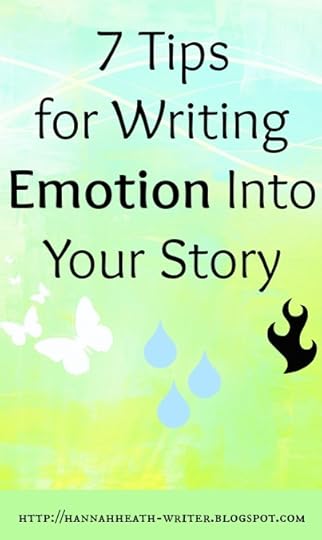 1. Ask yourself why your reader should care. Before you start trying to write an emotionally engaging story, you have to know why it’s important that your readers are engaged. While the answer “Because if they aren’t engaged they won’t like my book and then I’ll never sell my stories” is a very profound and noble response, you’ll want to dig a bit deeper. Why should they care? What will they take from it? We didn’t feel sympathy for Faramir because he was in an unfair position. We were touched by his story because we witnessed that somebody can stay kind and brave through bad situations. We cheer on Black Widow, not because her past was hard, but because we like seeing that people can correct and rise above their mistakes. Do you see where I’m going with this? Give your story a few core themes that anyone can identify with. If people can’t identify with or learn from it in even a small way, they won’t care. People are just selfish like that. Sorry.
1. Ask yourself why your reader should care. Before you start trying to write an emotionally engaging story, you have to know why it’s important that your readers are engaged. While the answer “Because if they aren’t engaged they won’t like my book and then I’ll never sell my stories” is a very profound and noble response, you’ll want to dig a bit deeper. Why should they care? What will they take from it? We didn’t feel sympathy for Faramir because he was in an unfair position. We were touched by his story because we witnessed that somebody can stay kind and brave through bad situations. We cheer on Black Widow, not because her past was hard, but because we like seeing that people can correct and rise above their mistakes. Do you see where I’m going with this? Give your story a few core themes that anyone can identify with. If people can’t identify with or learn from it in even a small way, they won’t care. People are just selfish like that. Sorry.
2. Be ready to be emotional yourself. If you aren’t emotionally engaged in your story, then there is no way that your readers will be. This is something that storytellers of all forms have come to recognize. I think it was best explained through the Stanislavski's system back in the early 1900’s: this actor and director taught his students to reach realism in their movies by bringing their own experiences and emotions to their roles. They were told to connect to their character and make it “alive” through their own thoughts and emotions. The same exact technique can be used for writing. Put yourself into the story and imagine what it would feel like to be this character or that character. Then write.
3. Come up with an anchor. If you are trying to write feelings into a scene, you’ll need a center emotion. All actions will come out of this center emotion. If there is more than one character in the room, then you’ll have more than one “center emotion.” Pick a word, a memory, an image, or a color that makes you feel that emotion. It will keep you focused and help prevent you from bleeding millions of emotions all over your page. When I wrote Skies of Dripping Gold , the anchor I picked for Gabriel was the picture of a man with a shattered black cloud sitting in his chest and oozing everywhere. For whatever reason, my brain connected that image with great amounts of confusion and anger and fear and determination, the very emotions I wanted Gabriel to come across as having. So whenever I wrote a scene focusing on him, that’s what I thought about. Not only did this help me accurately write his feelings, but it made the emotions so powerful that it ended up bleeding through into my readers. It’s only weird if it doesn’t work, right? Okay, everyone pretend that I didn’t just use Bud Light commercial logic to support my writing techniques.
4. Avoid being melodramatic. Say your character has just had a great triumph.We’re supposed to feel triumphant, too. But maybe you’re concerned that we won’t. So what should you do? Start talking about how the sun is pouring through the clouds and seems to pierce into his very heart, illuminating him and filling him with immeasurable triumphant-ness. Bad idea. If you feel the need to be overly enthusiastic about your emotion-painting, then you should probably look back at your story and see what went wrong. That being said, I know many writers who have made melodrama their style. That’s fine. But if you’re not a melodramatic writer and then randomly switch into melodrama, well, you have a problem.
5. Show rather than tell. As much as I hate writing rules, I think this one is pretty good as far as emotional writing goes. Don’t tell us you’re character is angry: Show her twitching right hand and the jutting out of her chin. Don’t mention the peacefulness of sitting under that tree: show us the way it’s leaves sway in the cool breeze. Don’t tell your readers about the feeling in the story, let them experience it for themselves.
6. Be concise. While you want to show your readers emotions, don’t show them too much. If a detail or emotion isn’t relevant to the scene or isn’t elemental in you moving your reader in a specific way, then cut it out.
7. Dialogue is key. In moments of heavy emotion, less dialogue is more. It’s not likely that your characters are going to sit down in a little circle and discuss their feelings. So make sure that whatever dialogue exists matters. It doesn’t have to be intelligent or even make sense: Emotions rarely do. It just has to make us feel. For example: [Warning: spoilers for Captain America: Civil War below] When Iron Man is tearing into Bucky after discovering that he killed his mother, he asks Bucky: “Do you even remember them?” Bucky could have responded in a lot of ways: “Yes, of course I do,” “Yes, and I feel so horrible and ashamed,” or “I’m so sorry, forgive me.” All of these would have been true statements, but they wouldn’t have felt right. What was his real response? “I remember all of them.” Add that to his tormented, confused, angered expression, and everybody in the audience feels like they’ve had their hearts ripped out. That, my friends, is how it’s done.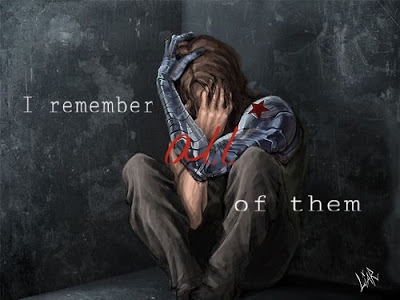 Just in case you didn't already feel sad...Writing emotions into a story is difficult work. Remember that the above are tips to help guide you: they aren’t hard and fast rules. Emotional writing is not entirely technical. Try not to overthink things. Just dive deep into your story and be ready to write hard.
Just in case you didn't already feel sad...Writing emotions into a story is difficult work. Remember that the above are tips to help guide you: they aren’t hard and fast rules. Emotional writing is not entirely technical. Try not to overthink things. Just dive deep into your story and be ready to write hard.
And, if that doesn't work, you can always make both of your characters have mothers named Martha. Then they can scream the word "Martha" and it will be very emotional. Actually, no. Under no circumstances should you do this. Sorry Snyder.
How do you write emotions into your story? Do you find it difficult, or does it come naturally? Who are some writers that do it admirably? As always, I’d love to hear your thoughts!
Related articles: 8 Tips for Developing a Strong Theme for Your Novel11 Songs to Listen to While Writing Moving ScenesSaveSave
8 Kinds of Strength to Give Your Characters
Enjoy this post? Please share on social media and take a look around. If you like what you see, don't forget to subscribe by email for a new post every Friday!
As a writer, this is one of my biggest fears. What if somebody reads my book and feels no emotion towards it? That’s about as large of a failure as most writers can imagine.
So how do we avoid this pitfall? How do we write emotions into our story? A difficult question, since “emotion” is a rather slippery word that is hard to define and even harder to teach people. But I think it's a question worth exploring. Ready? Okay, here we go:
 1. Ask yourself why your reader should care. Before you start trying to write an emotionally engaging story, you have to know why it’s important that your readers are engaged. While the answer “Because if they aren’t engaged they won’t like my book and then I’ll never sell my stories” is a very profound and noble response, you’ll want to dig a bit deeper. Why should they care? What will they take from it? We didn’t feel sympathy for Faramir because he was in an unfair position. We were touched by his story because we witnessed that somebody can stay kind and brave through bad situations. We cheer on Black Widow, not because her past was hard, but because we like seeing that people can correct and rise above their mistakes. Do you see where I’m going with this? Give your story a few core themes that anyone can identify with. If people can’t identify with or learn from it in even a small way, they won’t care. People are just selfish like that. Sorry.
1. Ask yourself why your reader should care. Before you start trying to write an emotionally engaging story, you have to know why it’s important that your readers are engaged. While the answer “Because if they aren’t engaged they won’t like my book and then I’ll never sell my stories” is a very profound and noble response, you’ll want to dig a bit deeper. Why should they care? What will they take from it? We didn’t feel sympathy for Faramir because he was in an unfair position. We were touched by his story because we witnessed that somebody can stay kind and brave through bad situations. We cheer on Black Widow, not because her past was hard, but because we like seeing that people can correct and rise above their mistakes. Do you see where I’m going with this? Give your story a few core themes that anyone can identify with. If people can’t identify with or learn from it in even a small way, they won’t care. People are just selfish like that. Sorry.2. Be ready to be emotional yourself. If you aren’t emotionally engaged in your story, then there is no way that your readers will be. This is something that storytellers of all forms have come to recognize. I think it was best explained through the Stanislavski's system back in the early 1900’s: this actor and director taught his students to reach realism in their movies by bringing their own experiences and emotions to their roles. They were told to connect to their character and make it “alive” through their own thoughts and emotions. The same exact technique can be used for writing. Put yourself into the story and imagine what it would feel like to be this character or that character. Then write.
3. Come up with an anchor. If you are trying to write feelings into a scene, you’ll need a center emotion. All actions will come out of this center emotion. If there is more than one character in the room, then you’ll have more than one “center emotion.” Pick a word, a memory, an image, or a color that makes you feel that emotion. It will keep you focused and help prevent you from bleeding millions of emotions all over your page. When I wrote Skies of Dripping Gold , the anchor I picked for Gabriel was the picture of a man with a shattered black cloud sitting in his chest and oozing everywhere. For whatever reason, my brain connected that image with great amounts of confusion and anger and fear and determination, the very emotions I wanted Gabriel to come across as having. So whenever I wrote a scene focusing on him, that’s what I thought about. Not only did this help me accurately write his feelings, but it made the emotions so powerful that it ended up bleeding through into my readers. It’s only weird if it doesn’t work, right? Okay, everyone pretend that I didn’t just use Bud Light commercial logic to support my writing techniques.
4. Avoid being melodramatic. Say your character has just had a great triumph.We’re supposed to feel triumphant, too. But maybe you’re concerned that we won’t. So what should you do? Start talking about how the sun is pouring through the clouds and seems to pierce into his very heart, illuminating him and filling him with immeasurable triumphant-ness. Bad idea. If you feel the need to be overly enthusiastic about your emotion-painting, then you should probably look back at your story and see what went wrong. That being said, I know many writers who have made melodrama their style. That’s fine. But if you’re not a melodramatic writer and then randomly switch into melodrama, well, you have a problem.
5. Show rather than tell. As much as I hate writing rules, I think this one is pretty good as far as emotional writing goes. Don’t tell us you’re character is angry: Show her twitching right hand and the jutting out of her chin. Don’t mention the peacefulness of sitting under that tree: show us the way it’s leaves sway in the cool breeze. Don’t tell your readers about the feeling in the story, let them experience it for themselves.
6. Be concise. While you want to show your readers emotions, don’t show them too much. If a detail or emotion isn’t relevant to the scene or isn’t elemental in you moving your reader in a specific way, then cut it out.
7. Dialogue is key. In moments of heavy emotion, less dialogue is more. It’s not likely that your characters are going to sit down in a little circle and discuss their feelings. So make sure that whatever dialogue exists matters. It doesn’t have to be intelligent or even make sense: Emotions rarely do. It just has to make us feel. For example: [Warning: spoilers for Captain America: Civil War below] When Iron Man is tearing into Bucky after discovering that he killed his mother, he asks Bucky: “Do you even remember them?” Bucky could have responded in a lot of ways: “Yes, of course I do,” “Yes, and I feel so horrible and ashamed,” or “I’m so sorry, forgive me.” All of these would have been true statements, but they wouldn’t have felt right. What was his real response? “I remember all of them.” Add that to his tormented, confused, angered expression, and everybody in the audience feels like they’ve had their hearts ripped out. That, my friends, is how it’s done.
 Just in case you didn't already feel sad...Writing emotions into a story is difficult work. Remember that the above are tips to help guide you: they aren’t hard and fast rules. Emotional writing is not entirely technical. Try not to overthink things. Just dive deep into your story and be ready to write hard.
Just in case you didn't already feel sad...Writing emotions into a story is difficult work. Remember that the above are tips to help guide you: they aren’t hard and fast rules. Emotional writing is not entirely technical. Try not to overthink things. Just dive deep into your story and be ready to write hard.And, if that doesn't work, you can always make both of your characters have mothers named Martha. Then they can scream the word "Martha" and it will be very emotional. Actually, no. Under no circumstances should you do this. Sorry Snyder.
How do you write emotions into your story? Do you find it difficult, or does it come naturally? Who are some writers that do it admirably? As always, I’d love to hear your thoughts!
Related articles: 8 Tips for Developing a Strong Theme for Your Novel11 Songs to Listen to While Writing Moving ScenesSaveSave
8 Kinds of Strength to Give Your Characters
Enjoy this post? Please share on social media and take a look around. If you like what you see, don't forget to subscribe by email for a new post every Friday!

Published on June 10, 2016 07:37
June 3, 2016
The Fantastic Five Dialog Tag - Five Pieces of Dialog from The Stump of the Terebinth Tree
Guess who gets a sneak peek at some of my writing? YOU! How lucky is that? It's like winning the Powerball...except you'll still walk away poor and there are no cameras involved. Or taxes. So, really, nothing like winning the Powerball. Pretend I didn't say that.
Nate Philbrick, an extremely talented writer with absolutely no sarcastic tendencies, has started a blogging tag called the "Fantastic Five Dialog Tag." It's awesome. It involves posting 5 out-of-context pieces of dialogue from your current WIP and then tagging fellow Wordlocks to do the same.
My WIP is The Stump of the Terebinth Tree, a YA Christian Fantasy. I tried pitching it to some agents prematurely, but then realized that I have a bit of a problem: I wrote it over the course of four years and my style has changed quite a bit since then. The solution? Rewrite it so that it will have a more cohesive feel. Yes, it's both as grueling and rewarding as it sounds. Satisfaction is not in my nature, but if it was I think I'd be pretty satisfied with how the process has been going so far.
Anyway, here are five of some of my favorite pieces of dialogue from The Stump of the Terebinth Tree. Enjoy:
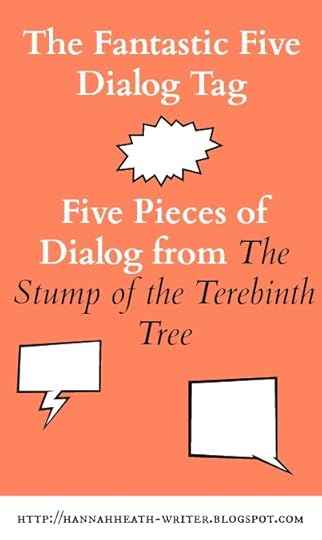 “Remember, Arwhil said not to apologize to anyone unless it was your fault or the person is bigger than you. Well, it wasn’t your fault and I’m certainly not bigger than you, so why are you apologizing?”
“Remember, Arwhil said not to apologize to anyone unless it was your fault or the person is bigger than you. Well, it wasn’t your fault and I’m certainly not bigger than you, so why are you apologizing?” “If you are not willing to give up all you have on this journey, you will never succeed.”
“I didn’t really expect to die going over a hundred-foot waterfall. That’s how idiots die. I would never have placed myself in that category until just now.”
“Why have you come, elfling? They told me you were a warrior of much wisdom. And yet here you are, ready to die like a fool for a world that will fall whether you sacrifice yourself or not. Do you not know, elfling, that you are defeated? Your power does not go beyond a sword and a reckless spirit. You can do nothing but die in a pool of your own blood. You will not win this battle.”
“I want to leave the world changed when I die. Don’t you?”
I think those five lines of fairly representative of the overall mood of the story. They are also five lines from the original manuscript that will make the cut and move on into my re-written version. Let's give them a round of applause for surviving my wrathful red highlighter!
Now, to tag some Wordlocks:
S.M. Metzler
Katherine Rebekah
Tamara Reuveni
Alena the Griffin Writer
Writer Alina
YOU! If you're reading this and think this looks like fun, please jump in.
Now go ahead and follow Nate Philbrick and the five other awesome people I've linked over to. You don't want to miss out on their content. What? Have I ever been wrong? I mean when it's important?!
Don't forget to tell me about some of the lines of dialogue from your own WIP! There are so many awesome writers out there and I'd be excited to read all of your pieces of dialogue....or dialog, depending on where you live. Please tell me I'm not the only one who is highly amused by the differences between American English and British-Or-Any-Non-American-English-Speakers English.
Anyway, leave a comment below and let me know which of my above pieces of dialogue you like. I'd like you honest opinion....Unless you dislike all of them, in which case: I'm not entirely sure that I've had enough tea to allow that kind of talk.
Related articles:
5 Steps to Writing 100% All Natural Dialogue - A Guest Post by Miranda Kulig
Flash Fiction Entry - The Life Of A Writer
Enjoy this post? Take a look around. If you like what you see, please don't forget to subscribe by email for a new post every week!SaveSaveSaveSave

Published on June 03, 2016 07:19
May 27, 2016
Fruit Juice and Vegan Mac & Cheese Inspired by R.J. Palacio's Wonder
The guy with a limp. The girl with down syndrome. The kid in a wheelchair or the man hooked up to an oxygen tank. These are not uncommon occurrences, and yet people never seem to know how to respond. They stare or let their eyes slide away in embarrassment or act overly differential.
I’ve never been able to decide whether I find this upsetting or pathetically funny.
As soon as you start throwing around words like “disabled,” “deformed,” or “diseased,” people freak out. After all, these are situations that many people can’t identify with or fully comprehend, so they’re not sure how to react.
This is something that Auggie Pullman knows all about. Okay, so maybe Auggie isn’t real. He’s a fictional character from R.J. Palacio’s Wonder . But he was meant to show the lives of people who are set apart physically by situations they had no control over. I read it a while ago and thought it was a beautiful, eye-opening story:
August Pullman just wants to blend in. He wants to be able to go out in public without drawing stares or play with other 10-year-olds rather than making them afraid. He may be a normal boy on the inside - he eats ice cream and loves Star Wars - but that’s not what most people see when they look at him.
Born with a severe facial abnormality, Auggie has been homeschooled his entire life. But now he’s entering 5th grade and it’s time for him to go to a public school and meet new people. How is he supposed to do that when nobody seems to want to sit next to a kid with a freaky face? How is he supposed to show them that he’s just a normal kid inside?
Told through the eyes of Auggie, his sister, and his friends, Wonder covers the wide range of emotions (good, bad, and just human) that come along with having something in your life that completely changes the way you approach the world, and how others approach you.
I usually don’t read middle grade fiction, but I made an exception for Wonder because I kept hearing that it was one of the better books out there. I was hesitant at first. The premise of the story made me assume that I was going to wind up wanting to yell at a fictional 5th grader for being a jerk. After all, that’s how many books featuring “special” characters go.
 However, Wonder took an interesting approach. It showed Auggie not only through his eyes, but through the eyes of his friends, family, and semi-antagonists. Rather than victimizing Auggie, Palacio showed him as a normal human being living through abnormal circumstances. It was neat to see how other people viewed him: at first with shock, sometimes with revulsion, but then with most of them coming around to recognize how Auggie isn’t that odd afterall. In fact, he’s a bit of a wonder.
However, Wonder took an interesting approach. It showed Auggie not only through his eyes, but through the eyes of his friends, family, and semi-antagonists. Rather than victimizing Auggie, Palacio showed him as a normal human being living through abnormal circumstances. It was neat to see how other people viewed him: at first with shock, sometimes with revulsion, but then with most of them coming around to recognize how Auggie isn’t that odd afterall. In fact, he’s a bit of a wonder.
One character I enjoyed in particular was Summer. At first she befriends Auggie out of pity. Unlike some of the other kids in the school, the principal didn’t take her aside and ask her to make friends with him. She just decided to sit with him once because she figured that nobody wants to sit at a lunch table all alone. So she took her mac and cheese over at sat next to him in what was meant to be a one-lunch offer of sympathy. But she soon comes to a surprising conclusion: This Auggie kid is actually a really neat, fun person. She eats lunch with him every day from then on out, not because she feels sorry for him, but because she enjoys his company.
That’s where the mac and cheese portion of this post comes from. And the juice? Auggie has a hard time eating certain foods because his jaw isn’t set right, so juice is his go-to when he’s hungry.
Mac & Cheese
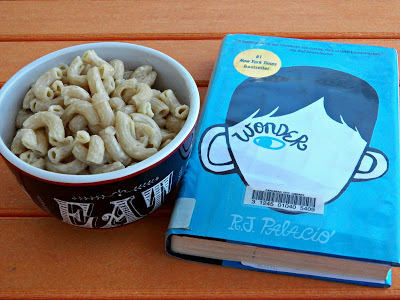 Ingredients -
Ingredients -
1 cup of raw cashews. Soak them for 4 to 7 hours in water, drain, then rinse. This releases the phytic acid that likes to hang out in nuts. You don't want phytic acid in your foods because it will bind to nutrients that you need, thus causing deficiencies. Not good.1/4 cup of nutritional yeast. No, you cannot skip this ingredient. You can find it at many hippy organic stores....Oh. Right. I believe the correct term is "health food stores." 1 and 1/3 cups of water 1/3 cup of olive oil1 teaspoon of garlic powder1 teaspoon of salt Your choice of pasta. I use rice pasta made by Tinkyada and they're the best gluten-free pasta I've found, so I'd recommend you go with them. Their trademark is a bit creepy, but more on that later.Directions -
1. Place all ingredients in the vitamix (I assume you can use a standard blender, though it may not come out as smooth). When I say "all ingredient," I am, of course, excluding the pasta. If you didn't know that, then I think it's safer for everyone if you stay out of the kitchen. Blend on high for about 1 minute, or until smooth.Viola! You now have vegan bechamel sauce. Does anyone else think that's a weird name? How can you have a vegan cream sauce? *shrugs*
 2. Bring a pot of water to boil. Add your pasta and cook according to the package instructions. The Tinkyada pasta cooks for 15 minutes. Try not to look at the logo when you open the package. It'll give you nightmares:
2. Bring a pot of water to boil. Add your pasta and cook according to the package instructions. The Tinkyada pasta cooks for 15 minutes. Try not to look at the logo when you open the package. It'll give you nightmares:
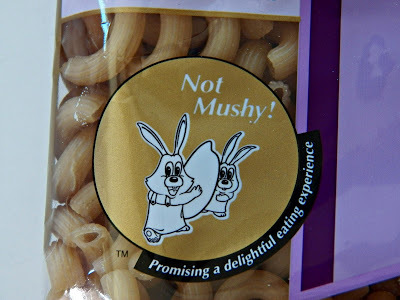 What even are those? Psychotic bunnies? And what do psychos or bunnies have to do with rice pasta? I don't know. I didn't think it could get any more weird until I saw this:
What even are those? Psychotic bunnies? And what do psychos or bunnies have to do with rice pasta? I don't know. I didn't think it could get any more weird until I saw this:
 Yeah. Well, I don't think you guys have to worry about anybody stealing your serial killer bunny logo. Just a guess. Okay, I'll stop making fun of them now. Their pasta really does taste good, though, I promise.
Yeah. Well, I don't think you guys have to worry about anybody stealing your serial killer bunny logo. Just a guess. Okay, I'll stop making fun of them now. Their pasta really does taste good, though, I promise.
3. Once the pasta is finished cooking, drain, rinse, and put back in the pot. Mix in some of your vegan bechamel sauce. You may need to add more salt. Stir, heat on low for a bit, then serve.
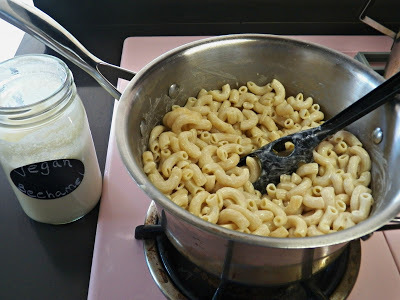 4. You'll have leftover vegan bechamel sauce. I had enough for an extra package of pasta. You can store it in your fridge for about 5 days. In case you're wondering, no, the sauce does not have a strong cashew flavor.
4. You'll have leftover vegan bechamel sauce. I had enough for an extra package of pasta. You can store it in your fridge for about 5 days. In case you're wondering, no, the sauce does not have a strong cashew flavor.
Fruit Juice
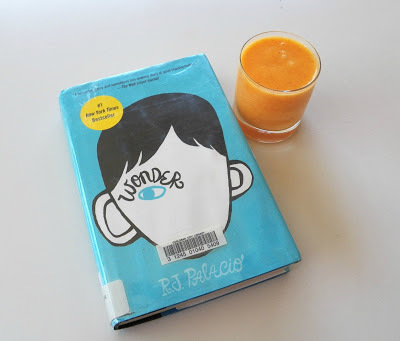
Ingredients -
1/2 cup of cold water1 orange, peeled and quartered1 apple, cored and quartered 1 carrot, chopped into thirds. 2-inch slice of pineapple Handful of ice cubesDirections -
1. Place all ingredients in vitamix. Blend on high for about 45 seconds (or until smooth). This juice will be a bit thick, so if you want to strain it, feel free. I didn't because I like pulp.
Despite the counter intuitive term "Vegan mac & cheese," this stuff tastes really good. It's creamy and the apparently psycho bunnies are really good cooks because the pasta is perfect (okay, that was the last one). This meal is gluten-free, vegan, a complete protein, tastes good, and doesn't require a lot of time or a highly decorated michelin star chef to prepare. Doesn't get much better than that.
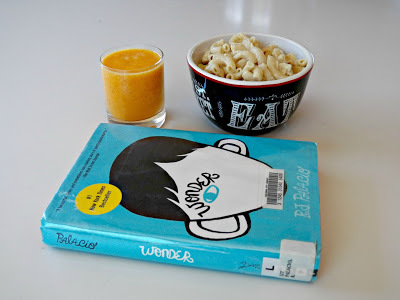
If you have yet to read Wonder, I recommend that you take some time to give it a look. It's a very sweet, eye-opening story that teaches empathy and helps show how to deal with hard situations that are difficult to fathom. It is, unfortunately, a bit fluffy and maybe the ending was a bit unrealistic, which is a bummer, but what do you expect from MG fiction? The message alone makes it worth the read, as do the incredible characters scattered throughout.
Have you read Wonder ? Do you plan to? I'd love to hear your thoughts!
Related articles:
Steamed Clams Inspired by Anthony Doerr's All the Light We Cannot See
Polymer Clay Book Tutorial + A Review of A Monster Calls by Patrick Ness
In Which I Make Mini Cottleston Pies Inspired by A.A. Milne's The World of Pooh
Enjoy this post? Take a look around. If you like what you see, please don't forget to subscribe by email for a new post every week!
Some links are Amazon affiliate. Thank you for supporting a poor writer.

I’ve never been able to decide whether I find this upsetting or pathetically funny.
As soon as you start throwing around words like “disabled,” “deformed,” or “diseased,” people freak out. After all, these are situations that many people can’t identify with or fully comprehend, so they’re not sure how to react.
This is something that Auggie Pullman knows all about. Okay, so maybe Auggie isn’t real. He’s a fictional character from R.J. Palacio’s Wonder . But he was meant to show the lives of people who are set apart physically by situations they had no control over. I read it a while ago and thought it was a beautiful, eye-opening story:
August Pullman just wants to blend in. He wants to be able to go out in public without drawing stares or play with other 10-year-olds rather than making them afraid. He may be a normal boy on the inside - he eats ice cream and loves Star Wars - but that’s not what most people see when they look at him.
Born with a severe facial abnormality, Auggie has been homeschooled his entire life. But now he’s entering 5th grade and it’s time for him to go to a public school and meet new people. How is he supposed to do that when nobody seems to want to sit next to a kid with a freaky face? How is he supposed to show them that he’s just a normal kid inside?
Told through the eyes of Auggie, his sister, and his friends, Wonder covers the wide range of emotions (good, bad, and just human) that come along with having something in your life that completely changes the way you approach the world, and how others approach you.
I usually don’t read middle grade fiction, but I made an exception for Wonder because I kept hearing that it was one of the better books out there. I was hesitant at first. The premise of the story made me assume that I was going to wind up wanting to yell at a fictional 5th grader for being a jerk. After all, that’s how many books featuring “special” characters go.
 However, Wonder took an interesting approach. It showed Auggie not only through his eyes, but through the eyes of his friends, family, and semi-antagonists. Rather than victimizing Auggie, Palacio showed him as a normal human being living through abnormal circumstances. It was neat to see how other people viewed him: at first with shock, sometimes with revulsion, but then with most of them coming around to recognize how Auggie isn’t that odd afterall. In fact, he’s a bit of a wonder.
However, Wonder took an interesting approach. It showed Auggie not only through his eyes, but through the eyes of his friends, family, and semi-antagonists. Rather than victimizing Auggie, Palacio showed him as a normal human being living through abnormal circumstances. It was neat to see how other people viewed him: at first with shock, sometimes with revulsion, but then with most of them coming around to recognize how Auggie isn’t that odd afterall. In fact, he’s a bit of a wonder. One character I enjoyed in particular was Summer. At first she befriends Auggie out of pity. Unlike some of the other kids in the school, the principal didn’t take her aside and ask her to make friends with him. She just decided to sit with him once because she figured that nobody wants to sit at a lunch table all alone. So she took her mac and cheese over at sat next to him in what was meant to be a one-lunch offer of sympathy. But she soon comes to a surprising conclusion: This Auggie kid is actually a really neat, fun person. She eats lunch with him every day from then on out, not because she feels sorry for him, but because she enjoys his company.
That’s where the mac and cheese portion of this post comes from. And the juice? Auggie has a hard time eating certain foods because his jaw isn’t set right, so juice is his go-to when he’s hungry.
Mac & Cheese
 Ingredients -
Ingredients - 1 cup of raw cashews. Soak them for 4 to 7 hours in water, drain, then rinse. This releases the phytic acid that likes to hang out in nuts. You don't want phytic acid in your foods because it will bind to nutrients that you need, thus causing deficiencies. Not good.1/4 cup of nutritional yeast. No, you cannot skip this ingredient. You can find it at many hippy organic stores....Oh. Right. I believe the correct term is "health food stores." 1 and 1/3 cups of water 1/3 cup of olive oil1 teaspoon of garlic powder1 teaspoon of salt Your choice of pasta. I use rice pasta made by Tinkyada and they're the best gluten-free pasta I've found, so I'd recommend you go with them. Their trademark is a bit creepy, but more on that later.Directions -
1. Place all ingredients in the vitamix (I assume you can use a standard blender, though it may not come out as smooth). When I say "all ingredient," I am, of course, excluding the pasta. If you didn't know that, then I think it's safer for everyone if you stay out of the kitchen. Blend on high for about 1 minute, or until smooth.Viola! You now have vegan bechamel sauce. Does anyone else think that's a weird name? How can you have a vegan cream sauce? *shrugs*
 2. Bring a pot of water to boil. Add your pasta and cook according to the package instructions. The Tinkyada pasta cooks for 15 minutes. Try not to look at the logo when you open the package. It'll give you nightmares:
2. Bring a pot of water to boil. Add your pasta and cook according to the package instructions. The Tinkyada pasta cooks for 15 minutes. Try not to look at the logo when you open the package. It'll give you nightmares: What even are those? Psychotic bunnies? And what do psychos or bunnies have to do with rice pasta? I don't know. I didn't think it could get any more weird until I saw this:
What even are those? Psychotic bunnies? And what do psychos or bunnies have to do with rice pasta? I don't know. I didn't think it could get any more weird until I saw this: Yeah. Well, I don't think you guys have to worry about anybody stealing your serial killer bunny logo. Just a guess. Okay, I'll stop making fun of them now. Their pasta really does taste good, though, I promise.
Yeah. Well, I don't think you guys have to worry about anybody stealing your serial killer bunny logo. Just a guess. Okay, I'll stop making fun of them now. Their pasta really does taste good, though, I promise.3. Once the pasta is finished cooking, drain, rinse, and put back in the pot. Mix in some of your vegan bechamel sauce. You may need to add more salt. Stir, heat on low for a bit, then serve.
 4. You'll have leftover vegan bechamel sauce. I had enough for an extra package of pasta. You can store it in your fridge for about 5 days. In case you're wondering, no, the sauce does not have a strong cashew flavor.
4. You'll have leftover vegan bechamel sauce. I had enough for an extra package of pasta. You can store it in your fridge for about 5 days. In case you're wondering, no, the sauce does not have a strong cashew flavor. Fruit Juice

Ingredients -
1/2 cup of cold water1 orange, peeled and quartered1 apple, cored and quartered 1 carrot, chopped into thirds. 2-inch slice of pineapple Handful of ice cubesDirections -
1. Place all ingredients in vitamix. Blend on high for about 45 seconds (or until smooth). This juice will be a bit thick, so if you want to strain it, feel free. I didn't because I like pulp.
Despite the counter intuitive term "Vegan mac & cheese," this stuff tastes really good. It's creamy and the apparently psycho bunnies are really good cooks because the pasta is perfect (okay, that was the last one). This meal is gluten-free, vegan, a complete protein, tastes good, and doesn't require a lot of time or a highly decorated michelin star chef to prepare. Doesn't get much better than that.

If you have yet to read Wonder, I recommend that you take some time to give it a look. It's a very sweet, eye-opening story that teaches empathy and helps show how to deal with hard situations that are difficult to fathom. It is, unfortunately, a bit fluffy and maybe the ending was a bit unrealistic, which is a bummer, but what do you expect from MG fiction? The message alone makes it worth the read, as do the incredible characters scattered throughout.
Have you read Wonder ? Do you plan to? I'd love to hear your thoughts!
Related articles:
Steamed Clams Inspired by Anthony Doerr's All the Light We Cannot See
Polymer Clay Book Tutorial + A Review of A Monster Calls by Patrick Ness
In Which I Make Mini Cottleston Pies Inspired by A.A. Milne's The World of Pooh
Enjoy this post? Take a look around. If you like what you see, please don't forget to subscribe by email for a new post every week!
Some links are Amazon affiliate. Thank you for supporting a poor writer.

Published on May 27, 2016 07:30
May 20, 2016
7 Tips for Writing a Character with a Chronic Illness
Rule #42 of storytelling: In the event of a sick character surrounded by healthy characters, the sick person must die.
Okay, so maybe that's not a rule that's written down anywhere official, but it might as well be. Sick characters in books die. That's just how it is. It's heartrending and sad, but somehow we writers can turn it into something beautiful and poetic.
But what about the people who are sick and just continue to suffer throughout the entire book? That’s not very popular. Why? Because it’s ugly. It’s sad and unfair and difficult to romanticize. Illness is hard to write about and many authors don’t even know where to begin. So they simply never do.
And that needs to change. Why? Because it’s real. Many people suffer from chronic illness, and you know what? People with chronic illness are pretty darn awesome. They’re brilliant characters just waiting to happen. All you need is a jumping-off point. Here are 7 pointers to keep in mind when writing chronically ill characters:
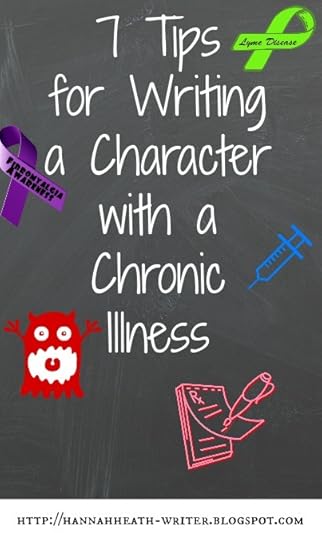 1. Give some thought to the illness your character has. When sick characters do show up in books, they are commonly cancer patients. Now, I am in no way belittling cancer, but really? Don't just slap on the first illness that comes to mind because it's convenient or well-known. Look around you. The world sucks, so we have no shortage of sicknesses to choose from. Lucky us. We've got chronic fatigue, we've got arthritis, we've got diabetes, lupus, myasthenia gravis, gaucher disease, epilepsy, multiple sclerosis, crohn's disease, narcolepsy, tourette's syndrome and, my personal favorite: lyme disease. Don't be afraid to step outside of the box.
1. Give some thought to the illness your character has. When sick characters do show up in books, they are commonly cancer patients. Now, I am in no way belittling cancer, but really? Don't just slap on the first illness that comes to mind because it's convenient or well-known. Look around you. The world sucks, so we have no shortage of sicknesses to choose from. Lucky us. We've got chronic fatigue, we've got arthritis, we've got diabetes, lupus, myasthenia gravis, gaucher disease, epilepsy, multiple sclerosis, crohn's disease, narcolepsy, tourette's syndrome and, my personal favorite: lyme disease. Don't be afraid to step outside of the box.
2. Try not to kill off your character. Not only is this a cliche, but it's an extremely unhelpful one. Look at it this way: Imagine you have a chronic illness. You fight it every day. And every time you open a book with a character who has similar struggles, that character dies. How do you feel? Yeah. Not very good. Besides, one of the things that makes chronic illness so difficult is that there's no real end in sight. The mental and emotional ramifications of this are huge and can add a lot of tension to your story. Now, if you have a distinct reason for killing of your sick character, then fine. Just don't do it because it's a convenient way to evoke emotion.
3. Remember that chronic illness does not have to be the point of your story. I think this is one of the reasons why books don't utilize chronic illnesses more often. Writers seem to think that the character's illness needs to be the central part of the story. Not true. Think of the amazing possibilities for characters with chronic illness in stories that aren't about said chronic illness: The body guard who serves a king while using a magic potion to keep his epilepsy at bay. An assassin who fights chronic pain. The young lady in the Victorian era who is pursuing an education while dealing with what is later discovered to be lupus. I don't know about you, but I'd love to read those stories. While it's great to write books about people with chronic illness, it would also be amazing to see more stories out there where a character's sickness is not their defining characteristic.
4. Find the middle ground between angelic and spoiled. We've all seen it: The sweet, frail girl who is a complete angel and suffers quietly. Likewise, we're pretty familiar with the sick old coot who's bitter about his lot in life and makes everyone suffer alongside of him. I know this will come as a huge shock, but people with chronic diseases aren't like this. Find a middle ground. Make your character a human being, not an angel or a spawn of the devil.
5. Do your homework. And not just on the symptoms. Look up treatments, the social and financial ramifications, the emotional strain, and the end game (Do they die young? Get worse as time goes by?). Read articles, read books, follow bloggers who write about their life as spoonies, read interviews. Or, better yet, find somebody with your chosen illness and see if they are open to answering your questions or giving you pointers. Just be respectful and understand that they may be too tired to feel like dealing with us overzealous writers.
6. Find what keeps them going. What kind of strength does your character have? There are a lot of different kinds out there, as touched on in this post. Find out which one fuels them. And then find out why it matters: Why do they keep fighting this illness? What do they use to aid them? I know a lot of spoonies have different techniques to help get them through a rough patch: breathing techniques, recalling quotes or bible verses, clutching a good-luck piece, saying their ABC's backwards (which is impressive, by the way. I can't even say mine forward without singing the ditty that goes with it). Find your character's reason for living and find their way of living. You know the saying: Where there's a will, there's a way. Find the will, find the way.
7. No pity points. Just because your character has a difficult life doesn't mean that he gets to behave badly. I'm just going to say it: Nobody wants to read about a whiny, "woe is me" character. Oh boo hoo, he has chronic pain. What? I don't care if it's mean. Depression and emotional struggle is fine, but we don't need any more characters who are a pity party incarnate, and we most definitely should not dismiss such behavior simply because the character is sick. It's not a good message to send.
Now, I may be slightly biased, but I think people with chronic illnesses would make epic characters. They face obstacles every day and just keep going. If that's not great character material, then I don't know what is.
Do you think you'll ever write a character with a chronic illness? Do you have any tips? I'd love to hear them! What is your favorite book/series that features a character with a chronic disease? Let me know if the comment section!
Related article:
4 Fundamental Errors in the Diverse Books Campaign (And How to Fix Them)
Writing Surfer Characters: 9 Things You Need to Know
7 Cliche Characters in YA Fiction That Need to Stop
Enjoy this post? Take a look around. If you like what you see, please don't forget to subscribe by email for a new post every week!
Okay, so maybe that's not a rule that's written down anywhere official, but it might as well be. Sick characters in books die. That's just how it is. It's heartrending and sad, but somehow we writers can turn it into something beautiful and poetic.
But what about the people who are sick and just continue to suffer throughout the entire book? That’s not very popular. Why? Because it’s ugly. It’s sad and unfair and difficult to romanticize. Illness is hard to write about and many authors don’t even know where to begin. So they simply never do.
And that needs to change. Why? Because it’s real. Many people suffer from chronic illness, and you know what? People with chronic illness are pretty darn awesome. They’re brilliant characters just waiting to happen. All you need is a jumping-off point. Here are 7 pointers to keep in mind when writing chronically ill characters:
 1. Give some thought to the illness your character has. When sick characters do show up in books, they are commonly cancer patients. Now, I am in no way belittling cancer, but really? Don't just slap on the first illness that comes to mind because it's convenient or well-known. Look around you. The world sucks, so we have no shortage of sicknesses to choose from. Lucky us. We've got chronic fatigue, we've got arthritis, we've got diabetes, lupus, myasthenia gravis, gaucher disease, epilepsy, multiple sclerosis, crohn's disease, narcolepsy, tourette's syndrome and, my personal favorite: lyme disease. Don't be afraid to step outside of the box.
1. Give some thought to the illness your character has. When sick characters do show up in books, they are commonly cancer patients. Now, I am in no way belittling cancer, but really? Don't just slap on the first illness that comes to mind because it's convenient or well-known. Look around you. The world sucks, so we have no shortage of sicknesses to choose from. Lucky us. We've got chronic fatigue, we've got arthritis, we've got diabetes, lupus, myasthenia gravis, gaucher disease, epilepsy, multiple sclerosis, crohn's disease, narcolepsy, tourette's syndrome and, my personal favorite: lyme disease. Don't be afraid to step outside of the box. 2. Try not to kill off your character. Not only is this a cliche, but it's an extremely unhelpful one. Look at it this way: Imagine you have a chronic illness. You fight it every day. And every time you open a book with a character who has similar struggles, that character dies. How do you feel? Yeah. Not very good. Besides, one of the things that makes chronic illness so difficult is that there's no real end in sight. The mental and emotional ramifications of this are huge and can add a lot of tension to your story. Now, if you have a distinct reason for killing of your sick character, then fine. Just don't do it because it's a convenient way to evoke emotion.
3. Remember that chronic illness does not have to be the point of your story. I think this is one of the reasons why books don't utilize chronic illnesses more often. Writers seem to think that the character's illness needs to be the central part of the story. Not true. Think of the amazing possibilities for characters with chronic illness in stories that aren't about said chronic illness: The body guard who serves a king while using a magic potion to keep his epilepsy at bay. An assassin who fights chronic pain. The young lady in the Victorian era who is pursuing an education while dealing with what is later discovered to be lupus. I don't know about you, but I'd love to read those stories. While it's great to write books about people with chronic illness, it would also be amazing to see more stories out there where a character's sickness is not their defining characteristic.
4. Find the middle ground between angelic and spoiled. We've all seen it: The sweet, frail girl who is a complete angel and suffers quietly. Likewise, we're pretty familiar with the sick old coot who's bitter about his lot in life and makes everyone suffer alongside of him. I know this will come as a huge shock, but people with chronic diseases aren't like this. Find a middle ground. Make your character a human being, not an angel or a spawn of the devil.
5. Do your homework. And not just on the symptoms. Look up treatments, the social and financial ramifications, the emotional strain, and the end game (Do they die young? Get worse as time goes by?). Read articles, read books, follow bloggers who write about their life as spoonies, read interviews. Or, better yet, find somebody with your chosen illness and see if they are open to answering your questions or giving you pointers. Just be respectful and understand that they may be too tired to feel like dealing with us overzealous writers.
6. Find what keeps them going. What kind of strength does your character have? There are a lot of different kinds out there, as touched on in this post. Find out which one fuels them. And then find out why it matters: Why do they keep fighting this illness? What do they use to aid them? I know a lot of spoonies have different techniques to help get them through a rough patch: breathing techniques, recalling quotes or bible verses, clutching a good-luck piece, saying their ABC's backwards (which is impressive, by the way. I can't even say mine forward without singing the ditty that goes with it). Find your character's reason for living and find their way of living. You know the saying: Where there's a will, there's a way. Find the will, find the way.
7. No pity points. Just because your character has a difficult life doesn't mean that he gets to behave badly. I'm just going to say it: Nobody wants to read about a whiny, "woe is me" character. Oh boo hoo, he has chronic pain. What? I don't care if it's mean. Depression and emotional struggle is fine, but we don't need any more characters who are a pity party incarnate, and we most definitely should not dismiss such behavior simply because the character is sick. It's not a good message to send.
Now, I may be slightly biased, but I think people with chronic illnesses would make epic characters. They face obstacles every day and just keep going. If that's not great character material, then I don't know what is.
Do you think you'll ever write a character with a chronic illness? Do you have any tips? I'd love to hear them! What is your favorite book/series that features a character with a chronic disease? Let me know if the comment section!
Related article:
4 Fundamental Errors in the Diverse Books Campaign (And How to Fix Them)
Writing Surfer Characters: 9 Things You Need to Know
7 Cliche Characters in YA Fiction That Need to Stop
Enjoy this post? Take a look around. If you like what you see, please don't forget to subscribe by email for a new post every week!

Published on May 20, 2016 09:56



